2015北京师范大学文学院考博真题讲义选编
北京师范大学文学院考博真题-参考书-分数线-分析资料-复习方法-育明考博
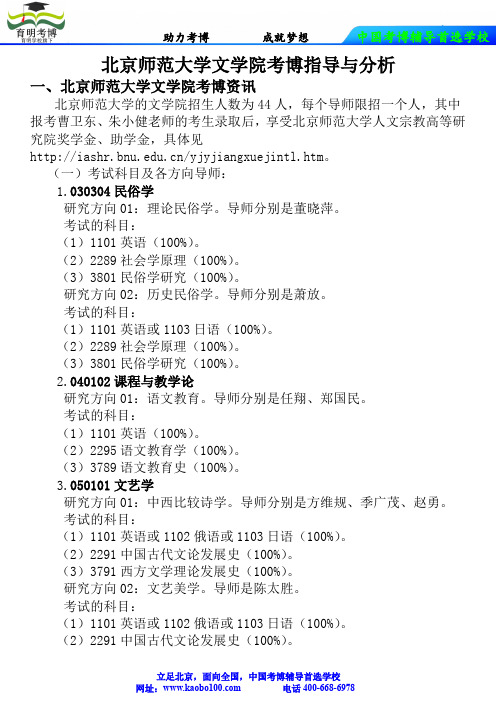
北京师范大学文学院考博指导与分析一、北京师范大学文学院考博资讯北京师范大学的文学院招生人数为44人,每个导师限招一个人,其中报考曹卫东、朱小健老师的考生录取后,享受北京师范大学人文宗教高等研究院奖学金、助学金,具体见/yjyjiangxuejintl.htm。
(一)考试科目及各方向导师:1.030304民俗学研究方向01:理论民俗学。
导师分别是董晓萍。
考试的科目:(1)1101英语(100%)。
(2)2289社会学原理(100%)。
(3)3801民俗学研究(100%)。
研究方向02:历史民俗学。
导师分别是萧放。
考试的科目:(1)1101英语或1103日语(100%)。
(2)2289社会学原理(100%)。
(3)3801民俗学研究(100%)。
2.040102课程与教学论研究方向01:语文教育。
导师分别是任翔、郑国民。
考试的科目:(1)1101英语(100%)。
(2)2295语文教育学(100%)。
(3)3789语文教育史(100%)。
3.050101文艺学研究方向01:中西比较诗学。
导师分别是方维规、季广茂、赵勇。
考试的科目:(1)1101英语或1102俄语或1103日语(100%)。
(2)2291中国古代文论发展史(100%)。
(3)3791西方文学理论发展史(100%)。
研究方向02:文艺美学。
导师是陈太胜。
考试的科目:(1)1101英语或1102俄语或1103日语(100%)。
(3)3095现代文论与美学(100%)。
研究方向03:中国文化与诗学。
导师是李春青。
考试的科目:(1)1101英语或1102俄语或1103日语(100%)。
(2)2291中国古代文论发展史(100%)。
(3)3791西方文学理论发展史(100%)。
研究方向04:文化与传播研究。
导师是毛峰。
考试的科目:(1)1101英语或1102俄语或1103日语(100%)。
(2)2291中国古代文论发展史(100%)。
(3)3129文化与传播(100%)。
2015北京师范大学外国语言文学学院 ——英语语言文学专业博课参考书-真题-分数线-资料-育明考博
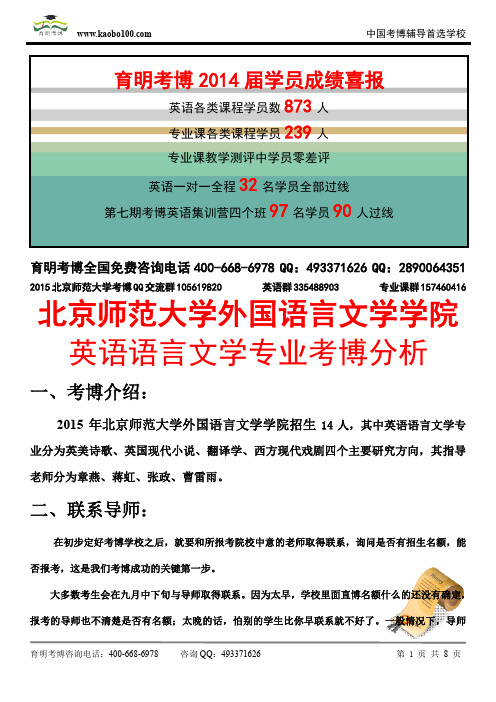
育明考博全国免费咨询电话400-668-6978 QQ:493371626 QQ:2890064351 2015北京师范大学考博QQ 交流群105619820 英语群335488903 专业课群157460416 北京师范大学外国语言文学学院英语语言文学专业考博分析一、考博介绍:2015年北京师范大学外国语言文学学院招生14人,其中英语语言文学专业分为英美诗歌、英国现代小说、翻译学、西方现代戏剧四个主要研究方向,其指导老师分为章燕、蒋虹、张政、曹雷雨。
二、联系导师:在初步定好考博学校之后,就要和所报考院校中意的老师取得联系,询问是否有招生名额,能否报考,这是我们考博成功的关键第一步。
大多数考生会在九月中下旬与导师取得联系。
因为太早,学校里面直博名额什么的还没有确定,报考的导师也不清楚是否有名额;太晚的话,怕别的学生比你早联系就不好了。
一般情况下,导师育明考博2014届学员成绩喜报 英语各类课程学员数873人 专业课各类课程学员239人 专业课教学测评中学员零差评 英语一对一全程32名学员全部过线 第七期考博英语集训营四个班97名学员90人过线对一个学生很中意的话,后来联系的学生,导师一般也不会答应其报考了。
在此说点题外话,联系导师的过程中,如果读研期间的导师有关系,可以尽量利用。
如果没有,也没关系,凭着自己的本事也是可以和考博导师很好的沟通的,这就要看自己了。
通常跟导师初次联系,都是发邮件。
导师回复邮件的情况一般有几种:(1)、欢迎报考。
这种答复最笼统,说明不了问题。
我们可以接着努力和老师多沟通,看看具体的进展,避免出现初试之后却没有名额的情况。
(2)、名额有限,可以报考,但有竞争。
很多人说这样的回复不满意,认为希望很小一般会被刷。
其实这样还是比较好的一种回答,最起码导师没有骗你而且给你机会去证明自己,考的好就可以上。
(3)、你的研究方向和我一样......各种一大堆他的研究方向和你相关,欢迎报考什么的话。
2014年北京师范大学文学院考博专业介绍,真题解析
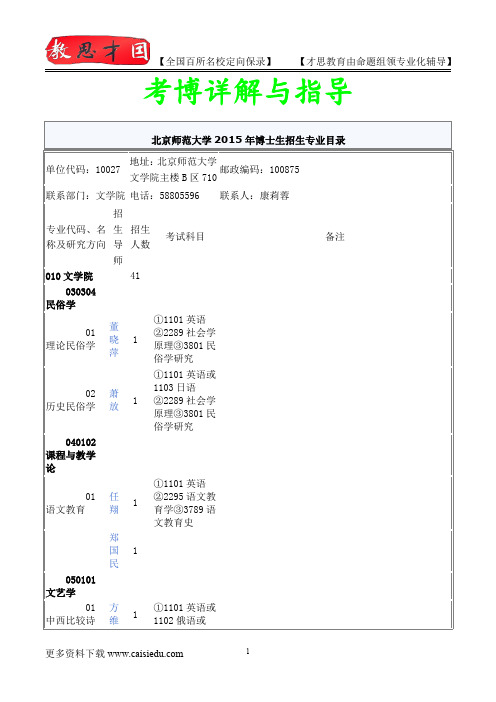
考博详解与指导北京师范大学2015年博士生招生专业目录单位代码:10027地址:北京师范大学文学院主楼B区710邮政编码:100875联系部门:文学院电话:58805596联系人:康莉蓉专业代码、名称及研究方向招生导师招生人数考试科目备注010文学院41 030304民俗学01理论民俗学董晓萍1①1101英语②2289社会学原理③3801民俗学研究02历史民俗学萧放1①1101英语或1103日语②2289社会学原理③3801民俗学研究040102课程与教学论01语文教育任翔1①1101英语②2295语文教育学③3789语文教育史郑国民1050101文艺学01中西比较诗方维1①1101英语或1102俄语或学规1103日语②2291中国古代文论发展史③3791西方文学理论发展史季广茂102文艺美学陈太胜1①1101英语或1102俄语或1103日语②2291中国古代文论发展史③3095现代文论与美学陈雪虎103中国文化与诗学李春青1①1101英语或1102俄语或1103日语②2291中国古代文论发展史③3791西方文学理论发展史04西方文论曹卫东1同上报考曹卫东老师的考生录取后享受北京师范大学人文宗教高等研究院奖学金、助学金,具体见/yjyjiangxuejintl.htm050102语言学及应用语言学01应用语言学(语言教学)傅爱兰1①1101英语②2296理论语言学与应用语言学③3793现代汉语与古代汉语050103汉语言文字学01汉字学李国英1①1101英语②2297汉语言文字学(古代汉语)③3072文字学齐元涛1王立军1周晓文102训诂学李运富1①1101英语或1103日语②2297汉语言文字学(古代汉语)③3086训诂学03汉语历史语法刘利1①1101英语②2297汉语言文字学(古代汉语)③3842汉语语法学04现代汉语史刁晏斌1①1101英语或1102俄语或1103日语②2041汉语言文字学(现代汉语)③3796现代汉语05汉语词汇孙银新1①1101英语或1102俄语或1103日语②2041汉语言文字学(现代汉语)③3093汉语词汇050104中国古典文献学01文学古籍整理与研究郭英德1①1101英语或1102俄语或1103日语②2298中国古代文学史③3843中国古代文学文献解读李山1050105中国古代文学01先秦两汉魏晋南北朝文学研究尚学锋1①1101英语或1102俄语或1103日语②2298中国古代文学史③3843中国古代文学文献解读02唐宋文学研究康震1同上03元明清文学研究张德建1同上050106中国现当代文学01中国现代文学李怡1①1101英语或1102俄语或1103日语②2299文学理论③3844现代文学刘勇1沈庆利1邹红102中国当代文学张健1①1101英语或1102俄语或1103日语②2299文学理论③3845当代文学张宁1张清华103儿童文学陈晖1①1101英语或1102俄语或1103日语②2299文学理论③3805儿童文学研究吴岩1050108比较文学与世界文学01西方文学与中西比较文学李正荣1①1101英语或1102俄语②2601比较文学基本理论③3877外国文学史刘洪涛1①1101英语②2601比较文学基本理论③3877外国文学史02东方文学与中日比较文学王向远1①1101英语或1103日语②2601比较文学基本理论③3155东方文学及日本文学03东亚文学(中日中韩)张哲俊1①1101英语或1103日语②2601比较文学基本理论③3127东亚比较文学04比较文学曹顺庆1①1101英语②2601比较文学基本理论③3877外国文学史0501Z1中国民间文学01中国民间文学万建中1①1101英语或1103日语②2006中国民间文化③3012中外民间文学杨利慧1第一部分、传统面试问题(Sample Traditional Interview Questions )1、What can you tell me about yourself?(关于你自己,你能告诉我些什么?)这一问题如果面试没有安排自我介绍的时间的话。
2015年北京师范大学教育学考博试题分析,考试真题,真题解析,复试真题,考博经验,真题笔记
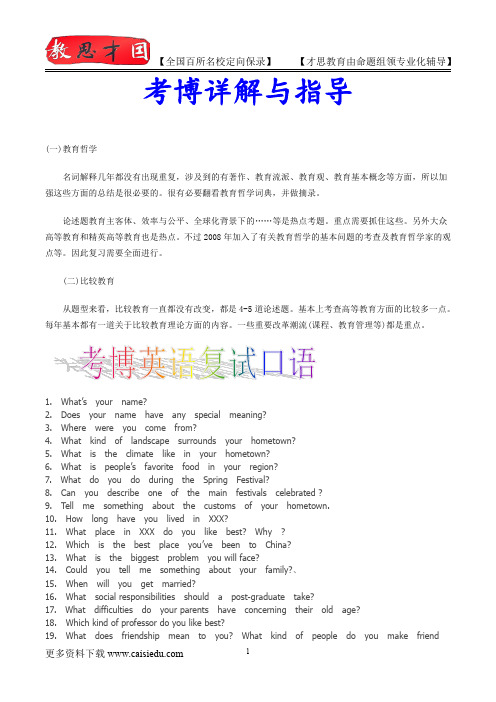
考博详解与指导(一)教育哲学名词解释几年都没有出现重复,涉及到的有著作、教育流派、教育观、教育基本概念等方面,所以加强这些方面的总结是很必要的。
很有必要翻看教育哲学词典,并做摘录。
论述题教育主客体、效率与公平、全球化背景下的……等是热点考题。
重点需要抓住这些。
另外大众高等教育和精英高等教育也是热点。
不过2008年加入了有关教育哲学的基本问题的考查及教育哲学家的观点等。
因此复习需要全面进行。
(二)比较教育从题型来看,比较教育一直都没有改变,都是4-5道论述题。
基本上考查高等教育方面的比较多一点。
每年基本都有一道关于比较教育理论方面的内容。
一些重要改革潮流(课程、教育管理等)都是重点。
1.What’s your name?2.Does your name have any special meaning?3.Where were you come from?4.What kind of landscape surrounds your hometown?5.What is the climate like in your hometown?6.What is people’s favorite food in your region?7.What do you do during the Spring Festival?8.Can you describe one of the main festivals celebrated?9.Tell me something about the customs of your hometown.10.How long have you lived in XXX?11.What place in XXX do you like best?Why?12.Which is the best place you’ve been to China?13.What is the biggest problem you will face?14.Could you tell me something about your family?、15.When will you get married?16.What social responsibilities should a post-graduate take?17.What difficulties do your parents have concerning their old age?18.Which kind of professor do you like best?19.What does friendship mean to you?What kind of people do you make friendwith?20.What is your major?21.How do you like your major?22.When and where did you graduate?What qualifications have you obtained?23.What impressed you most when you were at university?24.What is the best university in your opinion?25.Could you sum up your own study habits in a few points?26.Do you think the subjects you are studying today are relevant to present-day society?Why?27.What do you do for a living?28.What are your job prospects?29.If you had the opportunity to change your subject,what would you do with it?30.What are your spare time interests?31.How do you spend your weekends?32.What is your favorite sport?What are the rules?33.What kind of films do you like best?34.What kind of music do you enjoy?35.Where have you been traveling to?Which place interested you most?36.Do you enjoy traveling?If yes.Where and why?37.What kind of differences in the system of higher education between China and other countries?38.What problem do you think you will have in XXX?39.How will you overcome the difficulties?40.Do you think you will be able to cope with English-demands of your intended study program?41.What difficulties do you think you’ll encounter in your studies?42.What do you intend to study?43.Why did you choose our university?44.Would you want to be a volunteer during Olympic Games?45.If there were an opportunity of studying abroad,what would you do?46.Should you study more theory or do more practice?Give your reasons,please.52.How serious is unemployment among young people?53.In your opinion,what are the most serious problems associated with modern life?54.What do you think have been the most important changes in your study field over the past5years?55.As there are more and more private cars,what do you think the government should do in order to encourage citizens to use public transport?56.How do you see yourself in ten years’time?57.What business do you hope to have?58.What will do if you cannot find a job after graduation?59.How do you afford your tuition?60.Does your family support your decision on studying?What help do they offer?• 1.自我介绍(self-introduce)Good morning.I am glad to be here for this interview.First let me introduce myself.My name is***,24.I come from******,the capital of*******Province.I graduated from the*******department of *****University in July,2001.In the past two years I have been prepareing for the postgraduate examination while I have been teaching*****in NO.****middle School and I was a head-teacher of a class in junior grade two.Now all my hard work has got a result since I have a chance to be interview by you.I am open-minded,quick in thought and very fond of history.In my spare time,I have broad interests like many other youngers.I like reading books,especially those about*******.Frequently I exchange with other people by making comments in the forum on line.In addition,during my college years,I was once a Net-bar technician.So,I have a comparative good command of network application.I am able to operate the computer well.I am skillful in searching for information in Internet.I am a football fan for years.Italian team is my favorite.Anyway,I feel great pity for our country‘s team.I always believe that one will easily lag behind unless he keeps on learning.Of course,if I am given a chance to study ******in this famous University,I will stare no effort to master a good command of advance******.2.考研原因(reasons for my choice)There are several reasons.I have been deeply impressed by the academic atmosphere when I came here last summer.In my opinion,as one of the most famous******in our country,it provide people with enough room to get further enrichment.This is the first reason.The second one is I am long for doing research in******throughout my life.Its a pleasure to be with my favorite******for lifetime.I suppose this is the most important factor in my decision.Thirdly,I learnt a lot from my*****job during the past two years.However,I think further study is still urgent for me to realize self-value.Life is precious.It is necessary to seize any chance for self-development,especially in this competitive modern world.In a word,I am looking forward to making a solid foundation for future profession after two years study here.3.研究生期间你的计划(plans in the postgraduate study)First,I hope I can form systematic view of*****.As for******,my express wish is to get a complete comprehension of the formation and development as well as**************.If possible,I will go on with my study for doctorate degree.In a word,I am looking forward to making a solid foundation for future profession after two years study here.4.介绍你的家乡(about hometown)I am from,a famous city with a long history over2,200years.It is called“Rong Cheng”because there were lots of banians even900years ago.The city lies in the eastern part of the province.It is the center of politics,economy and culture.Many celebrities were born here,for instance,Yanfu,Xie Bingxin,Lin Zexu and so on..You know,there is a saying that“The greatness of a man lends a glory to a place”。
北京师范大学汉语言文字学刘利汉语历史语法考博参考书-考博分数线-专业课真题
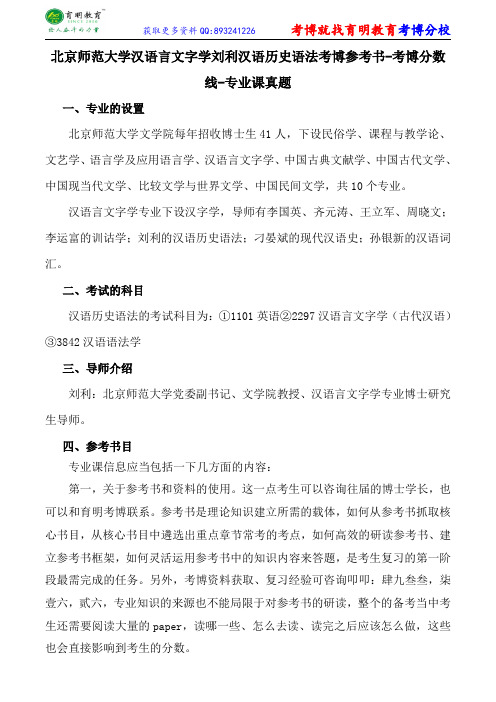
北京师范大学汉语言文字学刘利汉语历史语法考博参考书-考博分数线-专业课真题一、专业的设置北京师范大学文学院每年招收博士生41人,下设民俗学、课程与教学论、文艺学、语言学及应用语言学、汉语言文字学、中国古典文献学、中国古代文学、中国现当代文学、比较文学与世界文学、中国民间文学,共10个专业。
汉语言文字学专业下设汉字学,导师有李国英、齐元涛、王立军、周晓文;李运富的训诂学;刘利的汉语历史语法;刁晏斌的现代汉语史;孙银新的汉语词汇。
二、考试的科目汉语历史语法的考试科目为:①1101英语②2297汉语言文字学(古代汉语)③3842汉语语法学三、导师介绍刘利:北京师范大学党委副书记、文学院教授、汉语言文字学专业博士研究生导师。
四、参考书目专业课信息应当包括一下几方面的内容:第一,关于参考书和资料的使用。
这一点考生可以咨询往届的博士学长,也可以和育明考博联系。
参考书是理论知识建立所需的载体,如何从参考书抓取核心书目,从核心书目中遴选出重点章节常考的考点,如何高效的研读参考书、建立参考书框架,如何灵活运用参考书中的知识内容来答题,是考生复习的第一阶段最需完成的任务。
另外,考博资料获取、复习经验可咨询叩叩:肆九叁叁,柒壹六,贰六,专业知识的来源也不能局限于对参考书的研读,整个的备考当中考生还需要阅读大量的paper,读哪一些、怎么去读、读完之后应该怎么做,这些也会直接影响到考生的分数。
第二,专题信息汇总整理。
每一位考生在复习专业课的最后阶段都应当进行专题总结,专题的来源一方面是度历年真题考点的针对性遴选,另一方面是导师研究课题。
最后一方面是专业前沿问题。
每一个专题都应当建立详尽的知识体系,做到专题知识点全覆盖。
第三,专业真题及解析。
专业课的试题都是论述题,答案的开放性比较强。
一般每门专业课都有有三道大题,考试时间各3小时,一般会有十几页答题纸。
考生在专业课复习中仅仅有真题是不够的,还需要配合对真题最权威最正统的解析,两相印证才能够把握导师出题的重点、范围以及更加偏重哪一类的答案。
2015北京师范大学文学院考博真题以及讲解
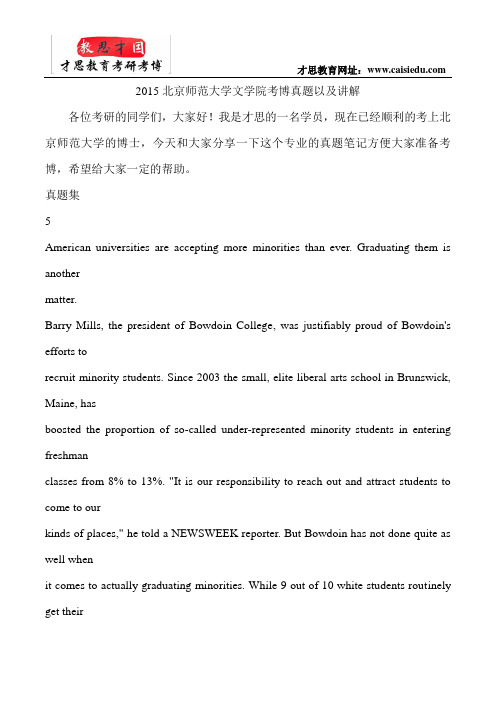
2015北京师范大学文学院考博真题以及讲解各位考研的同学们,大家好!我是才思的一名学员,现在已经顺利的考上北京师范大学的博士,今天和大家分享一下这个专业的真题笔记方便大家准备考博,希望给大家一定的帮助。
真题集5American universities are accepting more minorities than ever. Graduating them is anothermatter.Barry Mills, the president of Bowdoin College, was justifiably proud of Bowdoin's efforts torecruit minority students. Since 2003 the small, elite liberal arts school in Brunswick, Maine, hasboosted the proportion of so-called under-represented minority students in entering freshmanclasses from 8% to 13%. "It is our responsibility to reach out and attract students to come to ourkinds of places," he told a NEWSWEEK reporter. But Bowdoin has not done quite as well whenit comes to actually graduating minorities. While 9 out of 10 white students routinely get theirdiplomas within six years, only 7 out of 10 black students made it to graduation day in severalrecent classes."If you look at who enters college, it now looks like America," says Hilary Pennington, directorof postsecondary programs for the Bill & Melinda Gates Foundation, which has closely studiedenrollment patterns in higher education. "But if you look at who walks across the stage for adiploma, it's still largely the white, upper-income population."The United States once had the highest graduation rate of any nation. Now it stands 10th. For thefirst time in American history, there is the risk that the rising generation will be less welleducated than the previous one. The graduation rate among 25- to 34-year-olds is no better thanthe rate for the 55- to 64-year-olds who were going to college more than 30 years ago. Studiesshow that more and more poor and non-white students want to graduate from college –but theirgraduation rates fall far short of their dreams. The graduation rates for blacks, Latinos,andNative Americans lag far behind the graduation rates for whites and Asians. As the minoritypopulation grows in the United States, low college graduation rates become a threat to nationalprosperity.The problem is pronounced at public universities. In 2007 the University of Wisconsin-Madison–one of the top five or so prestigious public universities –graduated 81% of its white studentswithin six years, but only 56% of its blacks. At less-selective state schools, the numbers getworse. During the same time frame, the University of Northern Iowa graduated 67% of its whitestudents, but only 39% of its blacks. Community colleges have low graduation rates generally –but rock-bottom rates for minorities. A recent review of California community colleges foundthat while a third of the Asian students picked up their degrees, only 15% of African-Americansdid so as well.27. The result of the search for an easily digestible fat turned out to be _________________ .A. commercially uselessB. just as anticipatedC. somewhat controversialD. quite unexpected28. Olestra is different from ordinary fats in that ________________ ?A. it passes through the intestines without being absorbedB. it facilitates the absorption of vitamins by the bodyC. it helps reduce the incidence of heart diseaseD. it prevents excessive intake of vitamins29. What is a possible effect of olestra according to some critics?A. It may impair the digestive system.B. It may affect the overall fat intake.C. It may increase the risk of cancer.D. It may spoil the consumers’appetite.30. Why are nutritionists concerned about adding vitamins to olestra?A. It may lead to the over-consumption of vitamins.B. People may be induced to eat more than is necessary.C. The function of the intestines may be weakened.D. It may trigger a new wave of fake food production.才思教育自1995年开始开设北京地区高校考研辅导班,其中近90%考上北京知名高校攻读硕士研究生。
北师大现当代文学考博真题分享2015年北京师范大学现当代文学考博真题
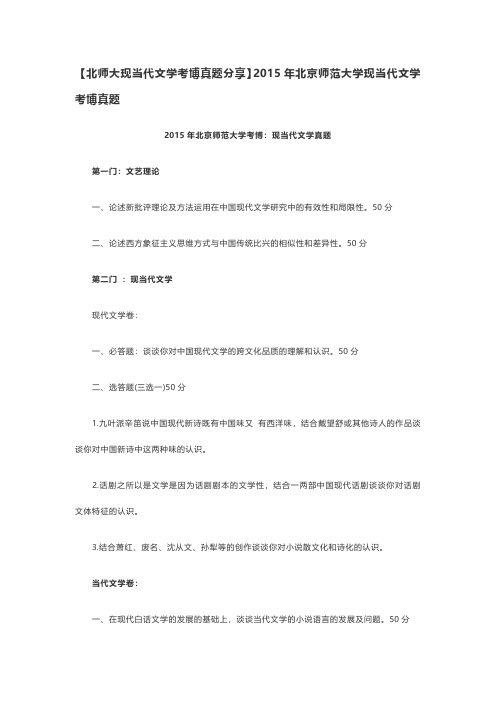
【北师大现当代文学考博真题分享】2015年北京师范大学现当代文学考博真题
2015年北京师范大学考博:现当代文学真题
第一门:文艺理论
一、论述新批评理论及方法运用在中国现代文学研究中的有效性和局限性。
50分
二、论述西方象征主义思维方式与中国传统比兴的相似性和差异性。
50分
第二门:现当代文学
现代文学卷:
一、必答题:谈谈你对中国现代文学的跨文化品质的理解和认识。
50分
二、选答题(三选一)50分
1.九叶派辛笛说中国现代新诗既有中国味又有西洋味,结合戴望舒或其他诗人的作品谈谈你对中国新诗中这两种味的认识。
2.话剧之所以是文学是因为话剧剧本的文学性,结合一两部中国现代话剧谈谈你对话剧文体特征的认识。
3.结合萧红、废名、沈从文、孙犁等的创作谈谈你对小说散文化和诗化的认识。
当代文学卷:
一、在现代白话文学的发展的基础上,谈谈当代文学的小说语言的发展及问题。
50分
二、谈谈先锋诗歌从七十年代末到世纪之交的发展脉络。
50分。
2015年北京师范大学文学院考博招生专业目录 考博真题 考博参考书目 考博资料

2015 年考研英语全程复习规划
对于非英语专业的学生,考研英语是让人头痛的科目,英语复习的重心在打牢语法知识和记忆 词汇,同时建议精读英文篇章,需要整理重要的生词,固定搭配以及分析核心长难句。 现将各阶段的任务与时间安排如下:
首先先说一下每天必须完成的任务:3 个长难句 至少 2 篇英语阅读理解 词汇背诵
①1101 英 语 或 1102 俄 语 或 1103 日 语 ②2299 文 学 理 论 ③3805 儿 童 文 学 研 究
①1101 英 语 ②2601 比 较 文 学 基 本 理 论③3877外国文学史
①1101 英语 或 1103 日 语②2601比较 文 学 基 本 理 论 ③3155 东 方 文 学 及 日 本文学 同上
开设课程:【网络函授班】 【精品小班】 【高端一对一】 【状元集训营】 【定向保录】
词要熟悉。 4 月 21 日至 4 月 27 日 将字母 C 至 E 的词汇复习完,完成标准同上。 4 月 28 日至 5 月 4 日 将字母 F 至 I 的词汇复习完,标准同上。 5 月 5 日至 5 月 11 日 回顾复习的所有词汇,将没有掌握的这次要掌握牢固。 5 月 12 日至 5 月 18 日 复习字母 G 至字母 N 的词汇,标准同上。 5 月 19 日至 5 月 25 日 复习字母 O 至字母 T 的词汇,标准同上。 5 月 26 日至 6 月 1 日 复习字母 U 至 Z 的词汇,标准同上。 6 月 1 日至 6 月 8 日 将复习完的词汇重新回顾,将掌握不牢固的词汇要加强记忆。
01 先 秦 两 汉
尚学
魏晋南北朝文学研
1
锋
究
02 唐 宋 文 学 康震 1
研究
03 元 明 清 文 李 真
北京师范大学文学院文艺学考博参考书-考博分数线-专业课真题
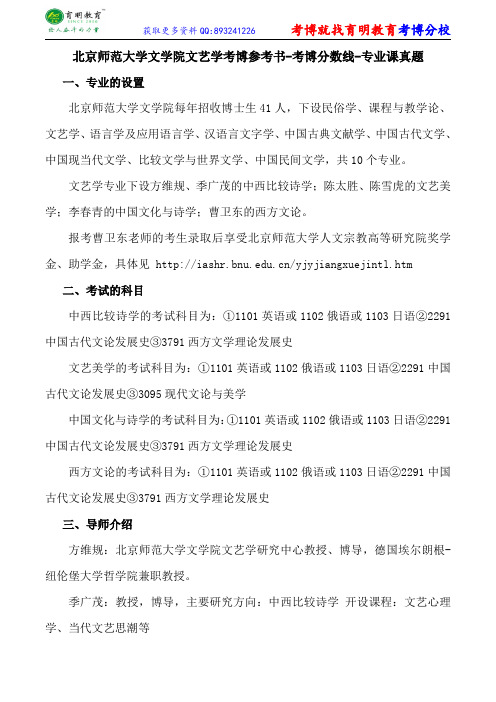
北京师范大学文学院文艺学考博参考书-考博分数线-专业课真题一、专业的设置北京师范大学文学院每年招收博士生41人,下设民俗学、课程与教学论、文艺学、语言学及应用语言学、汉语言文字学、中国古典文献学、中国古代文学、中国现当代文学、比较文学与世界文学、中国民间文学,共10个专业。
文艺学专业下设方维规、季广茂的中西比较诗学;陈太胜、陈雪虎的文艺美学;李春青的中国文化与诗学;曹卫东的西方文论。
报考曹卫东老师的考生录取后享受北京师范大学人文宗教高等研究院奖学金、助学金,具体见/yjyjiangxuejintl.htm二、考试的科目中西比较诗学的考试科目为:①1101英语或1102俄语或1103日语②2291中国古代文论发展史③3791西方文学理论发展史文艺美学的考试科目为:①1101英语或1102俄语或1103日语②2291中国古代文论发展史③3095现代文论与美学中国文化与诗学的考试科目为:①1101英语或1102俄语或1103日语②2291中国古代文论发展史③3791西方文学理论发展史西方文论的考试科目为:①1101英语或1102俄语或1103日语②2291中国古代文论发展史③3791西方文学理论发展史三、导师介绍方维规:北京师范大学文学院文艺学研究中心教授、博导,德国埃尔朗根-纽伦堡大学哲学院兼职教授。
季广茂:教授,博导,主要研究方向:中西比较诗学开设课程:文艺心理学、当代文艺思潮等陈太胜:教授,近年来主要从事于文学理论和中国现代诗学研究。
陈雪虎:教授,研究方向:文学理论、中国近代文论、文艺美学与大众文化。
李春青:博士,教授,博士生导师,北京师范大学文艺学研究中心主任、专职研究员,曾任北京师范大学文学院副院长、文艺学研究所所长,兼任中外文学理论学会理事,全国马克思主义文学理论研究会理事。
曹卫东:文学博士,教授,博士生导师。
曾任北京师范大学文学院副院长,党委宣传部部长兼新闻中心主任,北京师范大学副校长等职务四、参考书目专业课信息应当包括一下几方面的内容:第一,关于参考书和资料的使用。
北师大文学院2015年文学类各专业考研真题及答案

北师大文学院2015年文学类各专业考研真题及答案(远离尘嚣学长整理)中国古代文学史部分(共75分)一、填空题(每题1分,共15分)1、《春秋》中被称为微言大义的笔法叫做“春秋笔法”。
2、王逸称《九歌》“其俗信鬼而好祠,其祠,必作歌乐鼓舞以乐诸神”。
3、西汉董仲舒著名的给汉武帝的策论是《天人三策》。
4、汉代“骚体赋”的基本主题为“悲士不遇”。
5、东汉的经学高度发达,其经学代表人物为郑玄。
6、被刘勰《文心雕龙》称为“五言之冠冕”的作品是《古诗十九首》。
7、被钟嵘称为“辞采华茂”的诗人是曹植。
8、南朝辞赋史上和鲍照并称的辞赋作家是江淹。
9、盛唐骈文最杰出的代表是张说、苏颋,时人誉为“燕许大手笔”。
10、唐代组诗《秦中吟》的作者是白居易。
11、宋初“晚唐体”的代表诗人为林逋(填“九僧”应该也可以)。
12、李清照所说“句读不茸之诗”指的是词人苏轼。
13、元代被称为“万花丛中马神仙”的是马致远。
14、清代吴伟业的歌行作品被称作“梅村体”。
15、近代被称为“新派诗”的代表诗人是黄遵宪。
二、简答题(每题15分,共30分)1、杜甫的诗被称为“诗史”,谈谈你对此的理解。
2、“唱不尽兴亡梦幻,弹不尽悲伤感叹。
抵多少凄凉满眼对江山!”谈谈洪昇《长生殿》的历史理性精神。
三、论述题(共30分)程晋芳说:“外史纪儒林,刻画何工妍!”结合作品谈谈《儒林外史》的人物群像及历史贡献。
中国现当代文学史部分(共75分)一、名词解释(每题5分,共20分)1、“诗界革命”2、《语丝》3、《生死场》4、“新启蒙文学思潮”二、简答题(每题15分,共30分)1、简述李劼人“大河三部曲”的艺术结构及渊源。
2、简述1980年代“后朦胧诗”的文学史意义。
三、论述题(二选一,共25分)1、试述曹禺四部戏剧作品(《雷雨》、《日出》、《原野》、《北京人》)的象征意义。
2、试述从新中国成立到1990年历史题材小说的演变情况。
文学理论部分(共75分)一、名词解释(每题5分,共20分)1、“语言本体论”2、“卡塔西斯”3、“各师成心,其异如面”4、“一切文学,余爱以血书者”二、简答题(每题15分,共30分)1、简述苏轼“空静”观的主要内容及渊源。
2015年北京师范大学文学理论考研真题,考研流程,考研笔记,真题解析
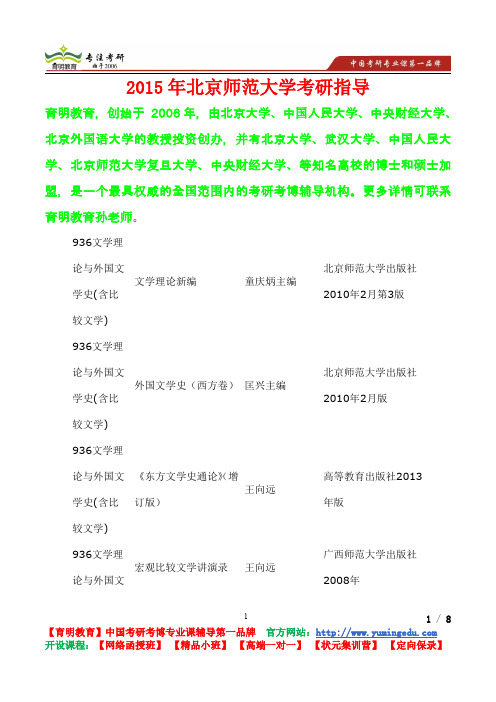
1/8【育明教育】中国考研考博专业课辅导第一品牌官方网站: 12015年北京师范大学考研指导育明教育,创始于2006年,由北京大学、中国人民大学、中央财经大学、北京外国语大学的教授投资创办,并有北京大学、武汉大学、中国人民大学、北京师范大学复旦大学、中央财经大学、等知名高校的博士和硕士加盟,是一个最具权威的全国范围内的考研考博辅导机构。
更多详情可联系育明教育孙老师。
936文学理论与外国文学史(含比较文学)文学理论新编童庆炳主编北京师范大学出版社2010年2月第3版936文学理论与外国文学史(含比较文学)外国文学史(西方卷)匡兴主编北京师范大学出版社2010年2月版936文学理论与外国文学史(含比较文学)《东方文学史通论》(增订版)王向远高等教育出版社2013年版936文学理论与外国文宏观比较文学讲演录王向远广西师范大学出版社2008年2/8【育明教育】中国考研考博专业课辅导第一品牌官方网站: 2学史(含比较文学)936文学理论与外国文学史(含比较文学)中国古代文论教程李壮鹰高等教育出版社2005年版提高暑假复习效率的三个万能定律一、鲶鱼效应:一个"竞争"的复习环境很久以前,挪威人从深海捕捞的沙丁鱼,总是还没到达海岸都已经口吐白沫。
然而,有一条渔船却总能带着活鱼上岸。
这是为什么呢?后来,人们才发现原来那条渔船在沙丁鱼槽里放进了鲶鱼。
鲶鱼是沙丁鱼的天敌,鲶鱼不断地追逐沙丁鱼,沙丁鱼拼命游动,激发了其内部的3/8【育明教育】中国考研考博专业课辅导第一品牌官方网站: 3活力,从而活了下来。
这就是"鲶鱼效应"。
"鲶鱼效应"告诉我们:竞争可以激发人们内在的活力。
对于考研的人来说,一个人闷头复习,经常会出现疲倦、无聊等反应。
而这对于复习来说,都是致命的大敌,将会严重影响复习的效率。
那么如果刺激自己,激活自己的内在活力呢?让我们在复习当中引进一条"鲶鱼"吧。
北京师范大学中国民间文学万建中、杨利慧考博参考书-考博分数线-专业课真题
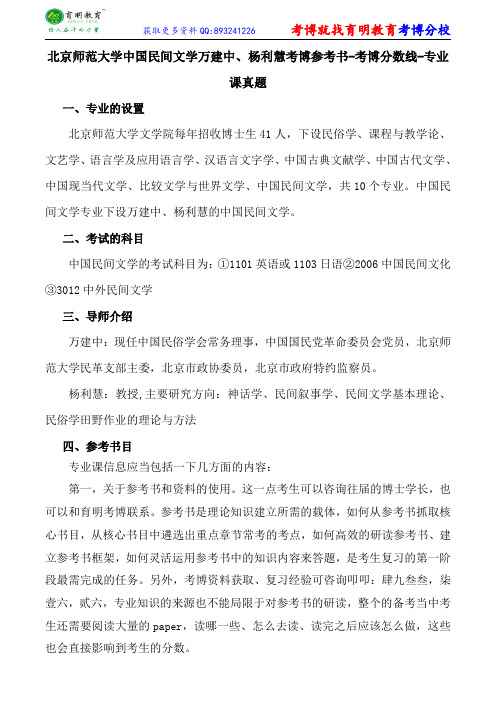
北京师范大学中国民间文学万建中、杨利慧考博参考书-考博分数线-专业课真题一、专业的设置北京师范大学文学院每年招收博士生41人,下设民俗学、课程与教学论、文艺学、语言学及应用语言学、汉语言文字学、中国古典文献学、中国古代文学、中国现当代文学、比较文学与世界文学、中国民间文学,共10个专业。
中国民间文学专业下设万建中、杨利慧的中国民间文学。
二、考试的科目中国民间文学的考试科目为:①1101英语或1103日语②2006中国民间文化③3012中外民间文学三、导师介绍万建中:现任中国民俗学会常务理事,中国国民党革命委员会党员,北京师范大学民革支部主委,北京市政协委员,北京市政府特约监察员。
杨利慧:教授,主要研究方向:神话学、民间叙事学、民间文学基本理论、民俗学田野作业的理论与方法四、参考书目专业课信息应当包括一下几方面的内容:第一,关于参考书和资料的使用。
这一点考生可以咨询往届的博士学长,也可以和育明考博联系。
参考书是理论知识建立所需的载体,如何从参考书抓取核心书目,从核心书目中遴选出重点章节常考的考点,如何高效的研读参考书、建立参考书框架,如何灵活运用参考书中的知识内容来答题,是考生复习的第一阶段最需完成的任务。
另外,考博资料获取、复习经验可咨询叩叩:肆九叁叁,柒壹六,贰六,专业知识的来源也不能局限于对参考书的研读,整个的备考当中考生还需要阅读大量的paper,读哪一些、怎么去读、读完之后应该怎么做,这些也会直接影响到考生的分数。
第二,专题信息汇总整理。
每一位考生在复习专业课的最后阶段都应当进行专题总结,专题的来源一方面是度历年真题考点的针对性遴选,另一方面是导师研究课题。
最后一方面是专业前沿问题。
每一个专题都应当建立详尽的知识体系,做到专题知识点全覆盖。
第三,专业真题及解析。
专业课的试题都是论述题,答案的开放性比较强。
一般每门专业课都有有三道大题,考试时间各3小时,一般会有十几页答题纸。
考生在专业课复习中仅仅有真题是不够的,还需要配合对真题最权威最正统的解析,两相印证才能够把握导师出题的重点、范围以及更加偏重哪一类的答案。
2015北京师范大学考博真题最核心基础阶段词汇
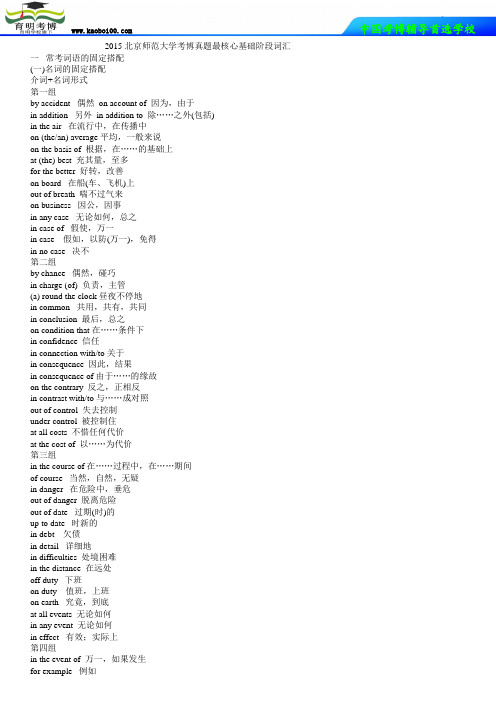
2015北京师范大学考博真题最核心基础阶段词汇一常考词语的固定搭配(一)名词的固定搭配介词+名词形式第一组by accident 偶然 on account of 因为,由于in addition 另外 in addition to 除……之外(包括)in the air 在流行中,在传播中on (the/an) average 平均,一般来说on the basis of 根据,在……的基础上at (the) best 充其量,至多for the better 好转,改善on board 在船(车、飞机)上out of breath 喘不过气来on business 因公,因事in any case 无论如何,总之in case of 假使,万一in case 假如,以防(万一),免得in no case 决不第二组by chance 偶然,碰巧in charge (of) 负责,主管(a) round the clock 昼夜不停地in common 共用,共有,共同in conclusion 最后,总之on condition that 在……条件下in confidence 信任in connection with/to关于in consequence 因此,结果in consequence of 由于……的缘故on the contrary 反之,正相反in contrast with/to 与……成对照out of control 失去控制under control 被控制住at all costs 不惜任何代价at the cost of 以……为代价第三组in the course of 在……过程中,在……期间of course 当然,自然,无疑in danger 在危险中,垂危out of danger 脱离危险out of date 过期(时)的up to date 时新的in debt 欠债in detail 详细地in difficulties 处境困难in the distance 在远处off duty 下班on duty 值班,上班on earth 究竟,到底at all events 无论如何in any event 无论如何in effect 有效;实际上第四组in the event of 万一,如果发生for example 例如with the exception of除……之外in the face of 面对,不顾,即使in fact 其实,实际上on fire 烧着on foot 步行in force 有效;实施中in favo(u)r of 有利于,赞成,支持in front of 在……面前in (the) future 今后,将来on guard 警惕,防范in general 通常,大体上in half 成两半at hand 在手边,在附近from tip to toe 彻头彻尾,完全by hand 用手hand down to 往下传,传给(后代)第五组hand in hand 手拉手,携手in hand 在掌握中,在控制中on hand 在手边,临近on (the) one hand... 一方面……,on the other hand...另一方面……at heart 在内心;实质上by heart 牢记,凭记忆at home 在家,在国内;自在,自如in honor of 以纪念,向……表示敬意on one’s honor 以名誉担保in a hurry 匆忙地,立即for instance 例如,举例说at intervals 不时,时时at last 最终,终于at least 至少,最低限度in the least 一点,丝毫第六组at length 终于,最后;详细地in the light of 按照,根据in line 成一直线,排成一行in line with 与……一致,按照at a loss 困惑,不知所措by all means 无论如何,必定by means of 借助于,用by no means 决不in memory of 纪念at the mercy of 在……支配下by mistake 错误地at the moment 现在,此刻for a moment 片刻,一会儿for the moment 现在,暂时in a moment 立刻,马上第七组in nature 本质上on occasion 有时,不时in order 秩序井然,整齐in order to 以便,为了in order that 以便out of order 发生故障,失调on one’s own 独自地,独立地in particular 特别地,尤其,详细地in the past 在过去,以往in person 亲自in place 在适当的位置in place of 代替in the first place 起初,首先in the last place 最后out of place 不得其所的,不适当的on the point 即将……的时候第八组to the point 切中要害,切题in practice 在实际中,实际上out of practice 久不练习,荒疏at present 目前,现在for the present 目前,暂时in proportion to (与……)成比例的in public 公开地,当众for (the) purpose of为了on purpose 故意,有意with the purpose of 为了in question 正在考虑at random 随意地,任意地at any rate 无论如何,至少by reason of 由于as regards 关于,至于with/in regard to 对于,就……而论第九组in/with relation to 关系到with respect to 关于as a result 结果,因此as a result of 由于……的结果in return 作为报答,作为回报on the road 在旅途中as a rule 规章,规则;通常,照例in the long run 最终,从长远观点看for the sake of 为了……起见on sale 出售;贱卖on a large scale 大规模地on a small scale 小规模地in secret 秘密地,私下地in a sense 从某种意义上说in shape 处于良好状态on the side 作为兼职,额外第十组at first sight 乍一看,初看起来in sight 被看到,在望out of sight 看不见,在视野之外in spite of 不管,不顾;尽管,虽然on the spot 当场,在现场in step 同步,合拍out of step 步调不一致,不协调in stock 现有,备有in sum 总而言之in tears 流着泪,含泪,哭in terms of 依据,按照;用……措词for one thing 首先,一则on the second thoughts 经重新考虑,一转念at a time 每次,一次at no time 从不,决不at one time 同时,曾经,从前曾第十一组at the same time 但是,然而,同时at times 有时for the time being 目前,暂时from time to time 有时,不时in no time 立即,马上in time 及时,适时地on time 准时on top of 在……之上out of touch 失去联系in truth 事实上,实际上,的确on try 试穿by turns 轮流,交替地in turn 依次,轮流in vain 徒劳,无效a variety of 种种,各种by virtue of 由于第十二组by the way 顺便提一下,另外by way of 经由,通过……方式in a way 在某点,在某种程度上in no way 决不in the way of 妨碍in one’s/the way 妨碍,阻碍after a while 过了一会,不久for a while 暂时,一时on the whole 总的来说in a word 总而言之in other words 换句话说,也就是说at work 在工作,忙于out of work 失业in the world 到底,究竟动词+名词形式第十三组have/gain access to 可以获得take...into account 考虑gain/have an advantage over胜过,优于pay the way for 为……铺平道路take advantage of 利用,趁……之机pay attention to 注意do/try one’s best 尽力,努力get the best of 胜过make the best of 充分利用,妥善处理get the better of 打败,致胜catch one’s breath 屏息,歇口气take care 小心,当心take care of 照顾,照料take a chance 冒险一试take charge of 担任,负责keep company with 与……交往take delight in 以……为乐with delight 欣然,乐意地第十四组make a/the difference 有影响,很重要carry/bring into effect 使生效,使起作用put into effect 实行,生效come/go into effect 生效,实施take effect 生效,起作用catch one’s eye 引人注目keep an eye on 留意,照看make faces 做鬼脸find fault 埋怨,挑剔catch fire 着火come/go into force 生效,实施make friends 交朋友,友好相处be friends with 对……友好,与……交上朋友make fun of 取笑,嘲弄keep one’s head 保持镇静lose one’s head 不知所措第十五组lose heart 丧失勇气,失去信心get/learn by heart 记住,背诵get hold of 抓住,掌握keep house 管理家务,做家务throw/cast light on 使明白,阐明bear/keep in mind 记住have in mind 记住,考虑到,想到make up one’s mind 下决心come/go into operation 使投入生产,使运转put in order 整理,检修keep/hold pace with 跟上,与……同步play a part 起作用take place 发生,进行take the place of 代替come to the point 说到要点,扼要地说bring/carry into practice 实施,实行第十六组make progress 进步,进展give rise to 引起,使发生make sense 讲得通,有意义catch the sight of 发现,突然看见(go) on the stage 当演员take one’s time 不急不忙,从容进行keep in touch 保持联系keep track 通晓事态,注意动向lose track 失去联系make use of 利用put to use 使用,利用give way 让路,让步lead the way 带路,引路make one’s way 前进,进行make way 让路,开路keep one’s word 遵守诺言第十七组act on 作用appeal to 呼吁,要求attempt at 企图,努力attitude to/towards 态度,看法a great/good deal of 大量(的),许多(的) influence on 影响interference in 干涉interference with 妨碍,打扰第十八组introduce to 介绍a lot (of) 许多(的),大量(的)lots of 大量,很多fall in love with 相爱,爱上a matter of (关于……)的问题a number of 若干,许多reply to 回答,答复a series of 一系列,一连串其他固定搭配第十九组trolley bus 无轨电车I.D. card 身份证credit card 信用卡no doubt 无疑,必定next door 隔壁out of doors 在户外face to face 面对面地as a matter of fact 实际情况,真相a few 有些,几个quite a few 还不少,有相当数目的a little 一点,稍微,一些,少许little by little 逐渐地quite a little 相当多,不少no matter 无论the moment (that) 一……就no more 不再第二十组fair play 公平竞赛;公平对待in demand 有需要,销路好rest room 厕所,盥洗室primary school 小学side by side 肩并肩,一个挨一个heart and soul 全心全意step by step 逐步ahead of time 提前all the time 一直,始终once upon a time 从前once in a while 偶尔,有时no wonder 难怪,怪不得word for word 逐字地decline with thanks 婉言谢绝(二)动词的固定搭配动词+介词形式第二十一组account for 说明(原因等)aim at 瞄准,针对allow for 考虑到appeal to 呼吁,要求arrive at 达成,得出ask after 询问,问候ask for 请求,要求attach to 附属于,隶属于begin with 从开始break into 闯入break off 断绝,结束break through 突破break up 中止,结束;打碎,折断bring about 带来,造成bring down 打倒,挫伤;降低bring forth 产生,提上第二十二组bring forward 提出bring out 使出现;公布;出版bring up 教育,培养,使成长build up 积累;堵塞;树立,逐步建立;增进;锻炼call for 邀请;要求;需求call forth 唤起,引起;振作起,鼓起call off 放弃,取消catch at 抓住(东西)call on/upon 访问,拜访;号召,呼吁call up 召集,动员;打电话care for 照管,关心;喜欢,意欲carry off 夺去carry on 继续下去;从事,经营carry out 贯彻,执行;实现come to 总计,达到;苏醒,复原count on 依靠;期待,指望count up 把……相加第二十三组cover up 掩饰,掩盖cut across 走捷径,抄近路deal with 处理,对付,安排do without 没有……也行fill in/out 填充,填写get at 得到,接近;意思是get into 进入,陷入go after 追求go into 进入;研究,调查go for 竭力想取得;喜爱;支持,拥护go through 经历,经受;详细检查go with 伴随,与……协调go without 没有……也行improve on 改进keep to 保持,坚持lie in 在于live up to 不辜负第二十四组live on/by 靠……生活,以……为食live through 度过,经受过look after 照管,照料look at 看望,注视look for 寻找,寻求look into 调查,观察,过问;窥视look over 检查,查看,调查look through 仔细查看,浏览,温习make for 走向,驶向;有助于occur to 被想到,被想起play with 以……为消遣,玩弄refer to 参考,查阅,涉及,提到run for 竞选run into 撞上,偶然碰见see to 注意,负责,照料,修理send for 派人去请,召唤;索取第二十五组send in 呈报,递交,送来serve as 作为,用作set aside 挑出,拨出,留出;拒绝sit for 参加stand by 支持,帮助;袖手旁观stand for 代替,代表,意味着stand against 反抗,抵抗stick to 坚持,忠于,信守take after 与……相像take for 把……认为是,把……看成是take in 接受,吸收;了解,理解take to 喜欢,亲近touch on 关系到,涉及turn into 变成turn to 变成;求助于,借助于turn off 关上;出产;解雇动词+副词形式第二十六组break down 损坏,分解,瓦解break in 闯入;打断,插嘴break out 逃出;突然发生,爆发bring to 使恢复知觉burn out 烧掉burn up 烧起来,旺起来;烧完catch on 理解,明白check in 办理登记手续check out 结账后离开;检验,核查check up (on) 校对,检查,检验cheer up 使高兴,使振奋clear away 扫除,收拾clear up 收拾;澄清;放晴make it clear that 弄清楚come off 实现,成功,奏效come on 请,来吧,快点;开始,出场,上演come out 出版;出现,显露;结果是第二十七组come round (around) 来访,前来;苏醒,复原come through 经历,脱险come up 走近,上来;发生,被提出cross out 删去,取消cut back 削减,减少cut down 削减,降低cut in (汽车)抢道;插嘴,打断cut off 切断;删去;停止cut out 删除cut short 突然停止die down 渐渐消失,平息die out 消失,灭绝draw in (火车、汽车)到站draw up 写上,画上;草拟;停住dress up 穿上盛装,打扮得很漂亮drop by/in 顺便来访dry out 干透,使干dry up 干涸,枯竭第二十八组drop off 减弱,减少drop out 退出,离队fall behind 落后fall out 争吵;结果是fall through 落空,失败feed in 输入find out 查明get across 解释清楚,使人了解get around/round 走动,旅行;(消息)传开get away 逃脱,离开get by 通过,经过get down 从……下来;写下get in 进入;收获,收集get off 从……下来;离开,动身,开始get over 克服;(从病中)恢复过来get through 结束,完成;接通电话have got to (do) 不得不,必须第二十九组get together 集合,聚集get up 起床;增加,增强give away 泄露;分送give back 送还,恢复give in 交上;投降,屈服give off 放出,释放give out 分发,放出give up 停止,放弃go ahead 开始,前进;领先go by 过去go down 下降,降低;被载入,传下去go off 爆炸,发射;动身,离开go out 外出;熄灭go over 检查,审查;复习,重温go round/around 足够分配go under 下沉,沉没;失败;破产go through 通过,审查,完成第三十组go up 上升,增加;建起hand down 流传下来,传给,往下传hand in 交上,递交hand on 传下来,依次传递hand out 分发,散发,发给hand over 交出,移交,让与hang about 闲荡,徘徊,逗留hang back 犹豫,踌躇,畏缩hang on 抓紧不放;继续下去hang up 挂断(电话)have back 要回,收回have on 穿着,戴着hold back 踌躇,退缩;阻止,抑制hold on 继续,握住不放hold out 维持,支持;坚持,不屈服hold up 举起,阻挡,使停止;抢劫第三十一组hurry up (使)赶快,迅速完成keep back 阻止,阻挡;隐瞒,保留keep down 控制,压制,镇压;压低keep off 不接近,避开keep up 保持,维持;继续,坚持let down 放下,降低;使失望let in 让……进入,放……进来let off 放(烟,烟火),开(枪)let out 放掉,放出,发出line up 排队,使排成一行look back 回顾,回头看look out 留神,注意,提防,警惕look on 旁观,观看;看待,视作look up 查阅,查考;寻找(某人)look in 顺便看望make out 辨认,区分;理解,了解make out of 用……做,从……得出第三十二组make up 构成,拼凑;弥补,赔偿;化装mix up 混淆,混合,搞糊涂pass away 去世,逝世pass off 中止,停止pass to 转到,讨论,传到pass out 失去知觉,昏倒pay back 偿还,回报pay off 还清(债)pay down 即时交付,用现金支付pay up 全部付清第三十三组pick out 选出,挑出,拣出;辨认,辨别出pick up 拾起,(偶然)得到;(车船)中途搭(人),学会pull down 拆毁,拉倒;拉下,降低pull in (车)停下,进站,船(到岸)pull off 脱(帽、衣)pull on 穿,戴pull out 拔出,抽出;(车、船)驶出pull together 齐心协力pull up (使)停下put across 解释清楚,说明put aside 储存,保留put away 放好,收好;储存put down 记下,放下;镇压,平定put forward 提出put in 驶进put on 穿上,戴上;上演;增加(体重)put out 熄灭,关(灯);出版,发布;生产put right 改正(错误),整理第三十四组put up 提起,举起,提(价);为……提供食宿,投宿ring off 挂断电话rub out 擦掉,拭去run down 撞倒,撞沉;追捕,追查run off 复印,打印run over 略读,略述;辗过,浏览,匆匆复习see off 给……送行see through 看穿,识破;干完,干到底set back 推迟,延缓,阻碍set down 卸下,放下,记下,记入set forth 阐明,陈述set off 出发,动身;引起,使发生set out 陈列,显示;动身,启程;制定set up 创立,建立,树立;资助,扶持show in 领入show off 炫耀,卖弄第三十五组show up 使呈现,使醒目shut out 排除sit in 列席,旁听sit up 迟睡,熬夜speed up 使加速stand out 突出,显眼stand up 站起来,耐用step up 提高,加快,加紧step in 插入,介入stick out 伸出,突出;坚持到底,继续take away 消除;消耗take down 记下,写下take off 拿走,脱下;起飞take on 呈现;接纳,承担,从事take over 接管,接办take up 占据;开始;拿起,接收take up with 和……交往,忍受,采用第三十六组think over 仔细考虑throw away 扔掉,抛弃touch up 润色,改进turn down 拧小,调低;拒绝turn in 交出,上缴;转身进入turn off 关掉,断开;拐弯,叉开turn on 接通,打开turn out 制造,生产;结果是turn over 翻过来;移交,转交turn up 开大;出现;来到;发生use up 用完,花完warm up 变热wear off 逐渐消失wear out 用破;耗尽,使精疲力竭while away 消磨(时间)wipe out 擦去,抹去;消灭,毁灭work out 解决,算出;弄懂,制定出work up 引起,激起;逐渐上升work on 从事于,努力做write off 报废,勾销,注销后接动名词的固定搭配第三十七组aim at 目的在于,旨在;瞄准accuse...of... 控告;谴责depend on 取决于devote to 奉献,致力engage in 从事于,忙着;订婚feel like 欲,想要go on 继续;发生cannot/couldn’t help禁不住;不得不insist on 坚持keep from 使……不(做)keep on 继续不断,保持look forward to 盼望,期待persist in 坚持,持续prevent from 预防,防止put off 推迟,推延set about 开始,着手succeed in 成功thank for 感谢think of 想起,想到;想一想其他固定搭配第三十八组add up to 合计,总计make believe 假装break away (from) 脱离,逃跑catch up with 追上,赶上come true 实现,达到come up to 达到,符合come up with 提出,提供concern with 关心,挂念;从事于do away with 废除,去掉have something to do with 和……有点关系have nothing to do with 和……毫无关系fall back on 求助于,转而依靠fall in with 符合,与……一致be fed up with 感到厌烦as follows 如下get along/on with 有进展,有进步;生活得get through 到达,完成,及格get somewhere 有些结果第三十九组get down to 开始,着手get out of 逃避,改掉get the better of 占上风,胜过have got 有give oneself away 泄露,露马脚give oneself up 自首,投降,投案give way to 给……让路,被……代替go along with 陪同前往,随行go back on 违背go in for 从事,致力于,追求go before 居前hang on to 紧握住,坚持下去have to/have got to 不得不,必须have to do with 与……有关help oneself 自取所需(食物)hold on to 紧紧抓住,坚持keep out of 躲开,置身……之外第四十组keep up with 向……看齐,跟上……lend itself to 适用于,对……有用let alone 不干涉;更不用说let loose 放开,放松,释放let go 放开,松手live up to 做到,不负look down on 看不起,轻视look up to 尊敬,敬仰be made up of 由……构成,由……组成make up for 补偿,弥补never mind 不要紧,没关系put in for 申请put up with 容忍,忍受refer to...as 把……称作,把……当做run out of 用完,用尽,耗尽serve right 活该,给应得的待遇第四十一组set in 来临,流行set out to 打算,着手stand up for 为……辩护;维护stand up to 面对,坚决抵抗;经得起come to stay 木已成舟stay by 守在一边take...as 把……作为think of...as 把……看做是,以为……是think better of 改变主意,重新考虑throw about 乱丢(东西),乱花(钱) throw down 推倒throw (a) light on 照亮,阐明(三)形容词的固定搭配第四十二组be able to (do) 能(做),会(做)be about to (do) 即将,正要be absent from 缺勤,缺课be abundant in 富于,富有be accustomed to 习惯于be acquainted with 与……相识,熟悉be active in 积极于be afraid of 恐怕,害怕,担忧be alive to 发觉,感觉,对……敏感be angry at 因某事生气be angry with 对……发怒be anxious about 担心,为……担忧be anxious for 急切盼望,渴望be anxious to (do) 渴望(做)be ashamed of 为……感到害臊be aware of 意识到第四十三组be bad at 拙于,不善于be badly off 生活穷困be based on 根据,以……为基础be bent on 热恋于,一心想be beside oneself 忘乎所以be better off 处境较好,情况好转be born in 出生于……be born of 出生于……(家庭)be bound to (do) 一定会,不得不be buried in 沉思,陷入,专心于be burned out 住所被烧光be busy (doing) 忙着(做某事)be busy with 忙于……be busy about 忙于……be careful of 爱惜,注意be careful to (do) 务必注意(做)第四十四组be certain to (do) 一定(做),必然(做)be capable of 能够be confident in 对……有信心be characterized by 以……为特征be clever at 擅长于be combined with 与……结合be composed of 由……组成be concerned about 关心,挂念be connected with 与……有关be coupled with 与……配合be covered with 被……覆盖be crowded with 挤满,拥塞be curious to (do) 很想(做)be dependent on/upon 取决于,依赖be derived from 由……得到be determined to (do) 决心(做)第四十五组be different from 与……不同be divided by 被……除以be divided into 被分成be eager for 渴望be eager to (do) 急于要(做)be engaged in 忙于,从事于be equal to 等于be famous for 以……著名be fed up 因多而厌烦be filled with 充满be fit for 适合,胜任be fond of 喜欢,爱好be free from 没有……的,不受……影响的be friendly to 对……友好be frightened at 受……惊吓be glad to (do) 乐于(做),对……感到高兴第四十六组be good at (doing) 善于,擅长be good for 适于,在……期间有效be grateful to 感谢,感激be identified as 被认为是be independent of 脱离……而独立,与……无关be indispensable for 对……必不可少的be interested in 对……感兴趣be involved in 包括……中,被卷入be involved with 涉及be kind enough to (do) 承……好意,恳请be known as 被称作……,以……著称be known to 为……所熟知be late for 迟到be likely to (do) 可能要,像是要be mad about 迷恋be made from 由……制成(化学变化)第四十七组be made of 由……制成(物理变化)be made up of 由……组成be mixed up 混杂,混在一起be obliged to (do) 被迫(做某事)be obliged to...for...因……而感激be well off 生活富裕be pleased to (do) 乐于be pleased with 对……感到满意be popular with 得人心的,受……欢迎的be possessed of 具有,拥有be prepared for 做……打算;对……做好准备be present at 出席be proud of 以……自豪,因……感到满意be provided with 装备有be ready to (do) 装备好(做);乐意(做)be ready for 为……准备好第四十八组be regarded as 被认为是,被当做是be rich in 富于be rid of 除去,摆脱get rid of 摆脱,除掉be satisfied with 对……满意,满足于be second to 次于be short for 是……的缩写(简称)be short of 短缺be sick for 渴望be sick in bed 病在床上be sick of 对……感到厌倦be sorry for 对……感到抱歉be strict with 对……要求严格be suited to 适合于be supposed to (do) 应该,非……不可be sure of 坚信,确信第四十九组be sure to (do) 一定,必定be surprised at 对……感到惊奇be taken aback 吃惊be taken by surprise 被突袭be terrified at 被……吓一跳be lost in thought 沉思be through with 结束be tired from 因……而疲乏be tired of 厌烦;对……厌倦be tired out 疲倦极了be torn open 被撕开be true of 适用于be unconscious of 不知道……be unequal to 无法胜任……的be unfit for 不适合,不胜任be united as one 团结一致第五十组be used as 被……用作be used to 习惯于get used to 习惯于be useful to 对……有用be well up in 精通,熟悉be wild with joy 欣喜若狂be willing to (do) 乐意……be worried about 为……而担心be worse off 处境较坏,情况恶化be worth (doing) 值得(做)be wrong with 有点毛病,有些不舒服(四)其他重要的固定搭配第五十一组above all 首先,毕竟after all 终于,毕竟;虽然这样at all 完全,根本all but 几乎,差一点all over 遍及,到处in all 总共,总计not at all 一点也不all out 全力以赴,竭尽全力leave alone 听其自然,更不用说along with 与……一起one after another 一个接一个one another 互相anything but 除……以外任何事(物),根本不as...as 像……一样as for 至于,就……方面说as if 好像,仿佛第五十二组as though 好像,仿佛as to 至于,关于as well 也,又as well as (除……之外)也,既……又not as/so...as 不如……那样back and forth 往返,来来往往地back of 在……后部,在……背部because of 由于,因为had better 最好还是,应该both...and 既……又……,两个都but for 除……以外,倘没有,除非each other 互相either...or 或……或,不是……就是;无论……还是or else 否则,要不然even if/though 即使,虽然even then 即使那样,连,都第五十三组except for 除……之外as/so far as 远至,到……程度by far ……得多,最far from 远非,远离so far 迄今为止first of all 首先,第一if only 要是……就好了in itself 本身at last 最终,终于at least 至少,最低程度no less than 决不少于,不亚(次)于a little 一点;一些,少许little by little 逐渐地quite a little 相当多,不少as/so long as 只要,如果第五十四组no longer 不再,已不a great/good many of 许多,大量many a 许多的more and more 越来越more or less 或多或少no more than 不过,仅仅;和……一样不at (the) most 最多,至少,不超过make the most of 充分利用neither...nor 既不……也不every now and then 有时,时时,偶尔just now 刚才,一会儿以前now and then 时而,不时now that 既然,由于off and on 断断续续,不时地and so on 等等第五十五组all at once 突然;同时,一起at once 立刻,马上once (and) for all 一劳永逸,限此一次once more 再一次,又一次by oneself 独自地,单独地every other 每隔一个地other than 不同于over and over (again) 一再,再三all right 好,行all round 周围,处处ever since 从那时起,自那时以来and so on/forth 等等ever so 非常,极其or so 大约,左右so...as to 结果是;如此……以至于第五十六组so that 以便,为的是;结果是so...that 如此……以至于such as 像……那样的;诸如,例如such...that 那样的……以致that is (=i. e.) 就是说,即up to 起来,从事于,忙于;直至what about (对于)……怎么样what if 如果……将会怎样,即使……又有什么要紧whether...or 是……还是,不管……还是go wrong 发生故障,出毛病and yet 可是,然而as yet 到目前(那时)为止abide by 坚持;遵守accustom to 使习惯adapt to (使)适应,适合;改编第五十七组adhere to 粘附,胶着;坚持apologize (ise) to,for 道歉,认错cling to 粘住;依附;坚持collide with 抵触compensate for 补偿,赔偿comply with 照做,遵照,应允conceive of 设想,构思;以为conform to 遵守,依照,符合,顺应consult with 商量,商议cooperate with 合作,协作,相配合cope with 竞争,对抗;对付,应付;妥善处理deduce from 演绎,推断derive from 导出,由……来deviate from 背离,偏离dispose of 处理,处置dispose for 布置,安排第五十八组dwell on 凝思;详述hinder from 阻止,妨碍impose on 把……强加给intervene in 干涉,干预;插入originate in/from 起源,发生;首创,创造participate in 参与,参加;分享preside at/over 主持prevail over/against 取胜,占优势;流行,盛行reconcile to/with 使一致reign over 统治;盛行restrain from 抑制,制止sacrifice for/to 牺牲,献出,献祭scrape through 擦过,勉强通过specialize in 专攻,专门研究,专业化第五十九组testify to 说明,证实flare up 突然燃烧起来;突然发怒queue up 排队,排队等待acquaint sb. With 使认识,使了解correspondence with通信congratulations on 祝贺dependence on 依靠;依赖;信赖dissatisfaction with/at 不满,不平exposure to 受到longing for 渴望objection to 反对,异议preference for to 偏爱,喜爱;优惠;优先选择proficiency in 熟练,精通requirement for 需要,需要的东西,要求thirst for 渴望,热望by comparison 比较起来第六十组in sequence 依次,逐一at stake 在危险中,利害攸关in accordance with 与……一致on behalf of 代表……,为了……accustomed to 习惯于on the sly 偷偷地,冷不防地in excess of 超过to and fro 来来回回on schedule 按预定时间on sight 一见就……,立即(五)超纲的其他固定搭配除了《考试大纲》规定考生要掌握的固定搭配之外。
北师大 古代文学 2015 考博真题回忆版
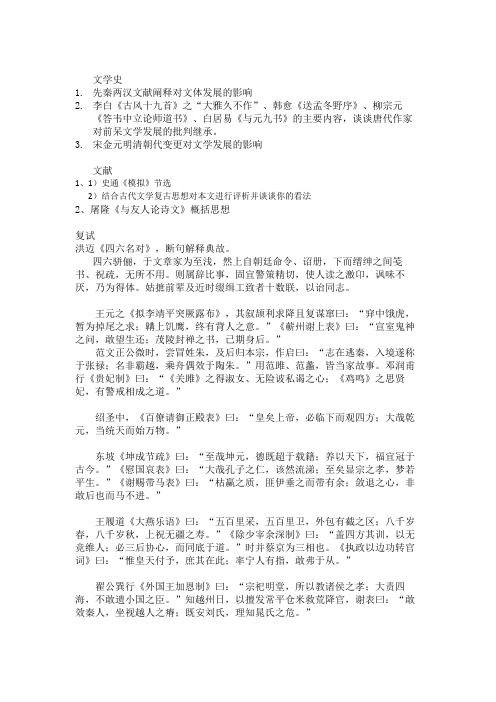
文学史1.先秦两汉文献阐释对文体发展的影响2.李白《古风十九首》之“大雅久不作”、韩愈《送孟冬野序》、柳宗元《答韦中立论师道书》、白居易《与元九书》的主要内容,谈谈唐代作家对前呆文学发展的批判继承。
3.宋金元明清朝代变更对文学发展的影响文献1、1)史通《模拟》节选2)结合古代文学复古思想对本文进行评析并谈谈你的看法2、屠隆《与友人论诗文》概括思想复试洪迈《四六名对》,断句解释典故。
四六骈俪,于文章家为至浅,然上自朝廷命令、诏册,下而缙绅之间笺书、祝疏,无所不用。
则属辞比事,固宜警策精切,使人读之激卬,讽味不厌,乃为得体。
姑摭前辈及近时缀缉工致者十数联,以诒同志。
王元之《拟李靖平突厥露布》,其叙颉利求降且复谋窜曰:“穽中饿虎,暂为掉尾之求;韝上饥鹰,终有背人之意。
”《蕲州谢上表》曰:“宣室鬼神之问,敢望生还;茂陵封禅之书,已期身后。
”范文正公微时,尝冒姓朱,及后归本宗,作启曰:“志在逃秦,入境遂称于张禄;名非霸越,乘舟偶效于陶朱。
”用范雎、范蠡,皆当家故事。
邓润甫行《贵妃制》曰:“《关雎》之得淑女、无险诐私谒之心;《鸡鸣》之思贤妃,有警戒相成之道。
”绍圣中,《百僚请御正殿表》曰:“皇矣上帝,必临下而观四方;大哉乾元,当统天而始万物。
”东坡《坤成节疏》曰:“至哉坤元,德既超于载籍;养以天下,福宜冠于古今。
”《慰国哀表》曰:“大哉孔子之仁,该然流涕;至矣显宗之孝,梦若平生。
”《谢赐带马表》曰:“枯赢之质,匪伊垂之而带有余;敛退之心,非敢后也而马不进。
”王履道《大燕乐语》曰:“五百里采,五百里卫,外包有截之区;八千岁春,八千岁秋,上祝无疆之寿。
”《除少宰余深制》曰:“盖四方其训,以无竞维人;必三后协心,而同底于道。
”时并蔡京为三相也。
《执政以边功转官词》曰:“惟皇天付予,庶其在此;率宁人有指,敢弗于从。
”翟公巽行《外国王加恩制》曰:“宗祀明堂,所以教诸侯之孝;大责四海,不敢遗小国之臣。
”知越州日,以擅发常平仓米救荒降官,谢表曰:“敢效秦人,坐视越人之瘠;既安刘氏,理知晁氏之危。
2015年北京师范大学考博英语真题
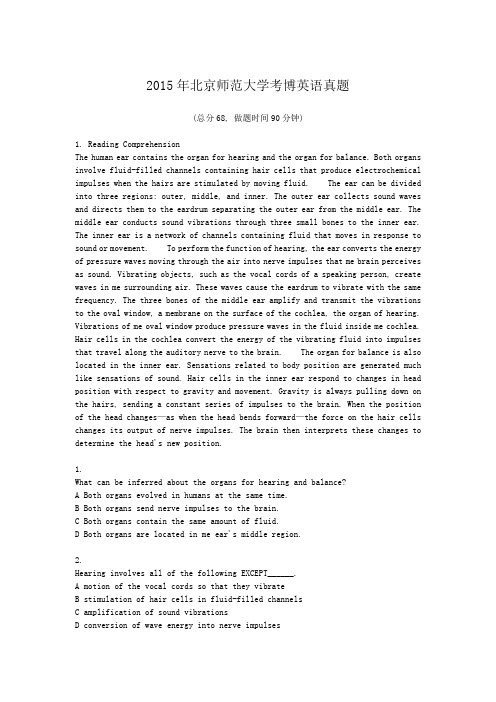
2015年北京师范大学考博英语真题(总分68, 做题时间90分钟)1. Reading ComprehensionThe human ear contains the organ for hearing and the organ for balance. Both organs involve fluid-filled channels containing hair cells that produce electrochemical impulses when the hairs are stimulated by moving fluid. The ear can be divided into three regions: outer, middle, and inner. The outer ear collects sound waves and directs them to the eardrum separating the outer ear from the middle ear. The middle ear conducts sound vibrations through three small bones to the inner ear. The inner ear is a network of channels containing fluid that moves in response to sound or movement. To perform the function of hearing, the ear converts the energy of pressure waves moving through the air into nerve impulses that me brain perceives as sound. Vibrating objects, such as the vocal cords of a speaking person, create waves in me surrounding air. These waves cause the eardrum to vibrate with the same frequency. The three bones of the middle ear amplify and transmit the vibrations to the oval window, a membrane on the surface of the cochlea, the organ of hearing. Vibrations of me oval window produce pressure waves in the fluid inside me cochlea. Hair cells in the cochlea convert the energy of the vibrating fluid into impulses that travel along the auditory nerve to the brain. The organ for balance is also located in the inner ear. Sensations related to body position are generated much like sensations of sound. Hair cells in the inner ear respond to changes in head position with respect to gravity and movement. Gravity is always pulling down on the hairs, sending a constant series of impulses to the brain. When the position of the head changes—as when the head bends forward—the force on the hair cells changes its output of nerve impulses. The brain then interprets these changes to determine the head's new position.1.What can be inferred about the organs for hearing and balance?A Both organs evolved in humans at the same time.B Both organs send nerve impulses to the brain.C Both organs contain the same amount of fluid.D Both organs are located in me ear's middle region.2.Hearing involves all of the following EXCEPT______.A motion of the vocal cords so that they vibrateB stimulation of hair cells in fluid-filled channelsC amplification of sound vibrationsD conversion of wave energy into nerve impulses3.It can be inferred from Paragraphs 2 and 3 that the cochlea is a part of______.A the outer earB me eardrumC the middle earD the inner ear4.What can be inferred from Paragraph 4 about gravity?A Gravity has an essential role in the sense of balance.B The ear converts gravity into sound waves in the air.C Gravity is a force that originates in the human ear.D The organ for hearing is not subject to gravity.5.In this passage, the author mainly explains______.A the organs of the human earB the function of the hearingC the three regions of the earD how the ear organ performs the hearing and balanceThe geology of the Earth's surface is dominated by the particular properties of water. Present on Earth in solid, liquid, and gaseous states, water is exceptionally reactive. It dissolves, transports, and precipitates many chemical compounds andis constantly modifying the face of the Earth. Evaporated from the oceans, water vapor forms clouds, some of which are transported by wind over the continents. Condensation from the clouds provides the essential agent of continental erosion: rain. Precipitated onto the ground, the water trickles down to form brooks, streams, and rivers, constituting what is called the hydrographic network. This immense polarized network channels the water toward a single receptacle: an ocean. Gravity dominates this entire step in the cycle because water tends to minimize its potential energy by running from high altitudes toward the reference point that is sea level. The rate at which a molecule of water passes through the cycle is not random butis a measure of the relative size of the various reservoirs. If we define residence time as the average time for a water molecule to pass through one of the three reservoirs—atmosphere, continent, and ocean—we see that the times are very different. A water molecule stays, on an average, eleven days in the atmosphere, one hundred years on a continent and forty thousand years in the ocean. This last figure shows the importance of the ocean as the principal reservoir of the hydrosphere but also the rapidity of water transport on the continents. A vast chemical separation process takes places during the flow of water over the continents. Soluble ions such as calcium, sodium, potassium, and some magnesium are dissolved and transported. Insoluble ions such as aluminum, iron, and silicon stay where they are and form the thin, fertile skin of soil on which vegetation can grow. Sometimessoils are destroyed and transported mechanically during flooding. The erosion of the continents thus results from two closely linked and interdependent processes, chemical erosion and mechanical erosion. Their respective interactions and efficiency depend on different factors.6.According to the passage, clouds are primarily formed by water______.A precipitating onto the groundB changing from a solid to a liquid stateC evaporating from the oceansD being carried by wind7.The passage suggests that the purpose of the "hydrographic network" is to______.A determine the size of molecules of waterB prevent soil erosion caused by floodingC move water from the Earth's surface to the oceansD regulate the rate of water flow from streams and rivers8.What determines the rate at which a molecule of water moves through the cycle, as discussed in the third paragraph?A The potential energy contained in water.B The effects of atmospheric pressure on chemical compounds.C The amounts of rainfall that fall on the continents.D The relative size of the water storage areas.9.All of the following are examples of soluble ions EXCEPT______.A magnesiumB ironC potassiumD calcium10.The word "efficiency" in line 21 is closest in meaning to______.A relationshipB growthC influenceD effectivenessScientists have long understood that supermassive black holes weighing millions or billions of suns can tear apart stars that come too close. The black hotels gravity pulls harder on the nearest part of the star, an imbalance that pulls the star apart over a period of minutes or hours, once it gets close enough. Scientists say this uneven pulling is not the only hazard facing the star. The strain of these unbalanced forces can also trigger a nuclear explosion powerful enough to destroy the star from within. Matthieu Brassart and Jean-Pierre Luminet of the Observatoire de Paris in Meudon, France, carried out computer simulations of the final moments of such anunfortunate star's life, as it veered towards a supermassive black hole. When the star gets close enough, the uneven forces flatten it into a pancake shape. Some previous studies had suggested this flattening would increase the density and temperature inside the star enough to trigger intense nuclear reactions that would tear it apart. But other studies had suggested that the picture would be complicated by shock waves generated during the flattening process and that no nuclear explosion should occur. The new simulations investigated the effects of shock waves in detail, and found that even when their effects are included, the conditions favor a nuclear explosion. " There will be an explosion of the star — it will be completely destroyed," Brassart says. Although the explosion obliterates the star, it saves some of the star's matter from being devoured by the black hole. The explosion is powerful enough to hurl much of the star's matter out of the black hole's reach, he says. The devouring of stars by black holes may already have been observed, although at a much later stage. It is thought mat several months after the event that rips the star apart, its matter starts swirling into the hole itself. It heats up as it does so, releasing ultraviolet light and X-rays. If stars disrupted near black holes really do explode, then they could in principle allow these events to be detected at a much earlier stage, says Jules Hatpern of Columbia University in New York, US2. "It may make it possible to see the disruption of that star immediately if it gets hot enough," he says. Brassart agrees. "Perhaps it can be observed in the X-rays and gamma rays, but it's something that needs to be more studied," he says. Supernova researcher Chris Fryer of the Los Alamos National Laboratory in Los Alamos, New Mexico, US3, says the deaths of these stars are difficult to simulate, and he is not sure whether the researchers have proven their case that they explode in the process.11.Something destructive could happen to a star that gets too close to a black hole. Which of the following destructive statements is NOT mentioned in the passage?A The black hole could tear apart the star.B The black hole could trigger a nuclear explosion in the star.C The black hole could dwindle its size considerably.D The black hole could devour the star.12.According to the third paragraph, researchers differed from each other in the problem of ______.A whether nuclear reaction would occurB whether the stars would increase its density and temperatureC whether shock waves would occurD whether the uneven forces would flatten the stars13.According to the fourth paragraph, which of the following is NOT true?A No nuclear explosion would be triggered inside the star.B The star would be destroyed completely.C Much of the star's matter thrown by the explosion would be beyond the black hole's reach.D The black hole would completely devour the star.14.What will happen several months after the explosion of the star?A The star's matter will move further away from by the black hole.B The black hole's matter will heat up.C The torn star's matter will swirl into the black hole.D The black hole's matter will release ultraviolet light and X-rays.15.According to the context, the word "disruption" in Paragraph 6 means______.A confusionB tearing apartC interruptionD flatteningOur culture has caused most Americans to assume not only that our language is universal but that the gestures we use are understood by everyone. We do not realize that waving good-bye is the way to summon a person from the Philippines to one's side, or that in Italy and some Latin-American countries, curling the finger to oneself is a sign of farewell. Those private citizens who sent packages to our troops occupying Germany after World War II and marked them GIFT to escape duty payments did not bother to find out that " Gift" means poison in German. Moreover, we like to think of ourselves as friendly, yet we prefer to be at least 3 feet or an arm's length away from others. Latins and Middle Easterners like to come closer and touch, which makes Americans uncomfortable. Our linguistic and cultural blindness and the casualness with which we take notice of the developed tastes, gestures, customs and languages of other countries, are making us lose friends, business and respect in the world. Even here in the United States, we make few concessions to the needs of foreign visitors. There are no information signs in four languages on our public buildings or monuments; we do not have multilingual guided tours. Very few restaurant menus have translations, and multilingual waiters, bank clerks and policemen are rare. Our transportation systems have maps in English only and often we ourselves have difficulty understanding them. When we go abroad, we tend to cluster in hotels and restaurants where English is spoken. Then attitudes and information we pick up are conditioned by those natives—usually the richer —who speak English. Our business dealings, as well as the nation's diplomacy, are conducted through interpreters. For many years, America and Americans could get by with cultural blindness and linguistic ignorance. After all America is the most powerful country of the free world, the distributor needed funds and goods. But all that is past. American dollars no longer buy all good things, and we are slowly beginning to realize that our proper role in the world is changing. A 1979 Harris poll reported that 55 percent of Americans want this country to play a moresignificant role in world affairs; we want to have a hand in the important decisions of the next century, even though it may not always be the upper hand.16.It can be inferred that Americans being approached too closely by Middle Easterners would most probably______.A stand stillB jump asideC step forwardD draw back17.The author gives many examples to criticize Americans for their______.A cultural self-centerednessB casual mannersC indifference towards foreign visitorsD arrogance towards other countries18.In countries other than their own most Americans______.A are isolated by the local peopleB are not well informed due to the language barrierC tend to get along well with the nativesD need interpreters in hotels and restaurants19.According to the author, Americans' cultural blindness and linguistic ignorance will______.A affect their image in the new eraB cut themselves off from the outside worldC limit their role in world affairsD weaken the position of the US dollar20.The author's intention in writing this article is to make Americans realizethat______.A it is dangerous to ignore their foreign friendsB it is important to maintain their leading role in world affairsC it is necessary to use several languages in public placesD it is time to get acquainted with other culturesHistorians have only recently begun to note the increase in demand for luxury goods and services that took place in 18th-century England. McKendrick has explored the Wedgwood firm's remarkable success in marketing luxury pottery; Plumb has written about the proliferation of provincial theaters, musical festivals, and children's toys and books. While the fact of this consumer revolution is hardly in doubt, three key questions remain: Who were the consumers? What were their motives? And what were the effects of the new demand for luxuries? An answer to the first of these hasbeen difficult to obtain. Although it has been possible to infer from the goods and services actually produced what manufactures and servicing trades thought their customers wanted, only a study of relevant personal documents written by actual consumers will provide a precise picture of who wanted what. We still need to know how large this consumer market was and how far down the social scale the consumer demand for luxury goods penetrated. With regard to this last question, we might note in passing that Thompson, while rightly restoring laboring people to the stage of 18th-century English history, has probably exaggerated the opposition of these people to the inroads of capitalist consumerism in general; for example, laboring people in eighteenth-century England readily shifted from home-brewed beer to standardized beer produced by huge, heavily capitalized urban breweries. To answer the question of why consumers became so eager to buy, some historians have pointed to the ability of manufacturers to advertise in a relatively uncensored press. This, however, hardly seems a sufficient answer. McKendrick favors a Veblen model of conspicuous consumption stimulated by competition for status. The "middling sort" bought goods and services because they wanted to follow fashions set by the rich. Again, we may wonder whether this explanation is sufficient. Do not people enjoy buying things as a form of self-gratification? If so, consumerism could be seen as a product of the rise of new concepts of individualism and materialism(a preoccupation with or stress upon material rather than intellectual or spiritual things), but not necessarily of the frenzy for conspicuous competition. Finally, what were the consequences of this consumer demand for luxuries? McKendrick claims that it goes a long way toward explaining the coming of the Industrial Revolution. But does it? What, for example, does the production of high-quality pottery and toys have to do with the development of iron manufacture or textile mills? It is perfectly possible to have the psychology and reality of a consumer society without a heavy industrial sector. That future exploration of these key questions is undoubtedly necessary should not, however, diminish the force of the conclusion of recent studies: the insatiable demand in eighteenth-century England for frivolous as well as useful goods and services foreshadows our own world.21.In the first paragraph, the author mentions McKendrick and Plumb most probably in order to ______.A contrast their views on the subject of luxury consumerism in 18th-century EnglandB indicate the inadequacy of historiographical approaches to 18th-century English historyC give examples of historians who have helped to establish the fact of growing consumerism in 18th-century EnglandD support the contention that key questions about 18th-century consumerism remain to be answered22.Which of the following items, if preserved from 18th-century England, would provide an example of the kind of documents mentioned in lines 3-4, Paragraph 2?A A written agreement between a supplier of raw materials and a supplier of luxury goods.B A diary that mentions luxury goods and services purchased by its author.C A theater ticket stamped with the date and name of a particular play.D A payroll record from a company that produced luxury goods such as pottery.23.According to the text, Thompson attributes to laboring people in 18th-century England which of the following attitudes toward capitalist consumerism?A Enthusiasm.B Curiosity.C Ambivalence.D Hostility.24.In the third paragraph, the author is primarily concerned with______.A contrasting two theses and offering a compromiseB questioning two explanations and proposing a possible alternative to themC paraphrasing the work of two historians and questioning their assumptionsD examining two theories and endorsing one over the other25.According to the text, 18th-century England and the contemporary world of the text readers are______.A dissimilar in the extent to which luxury consumerism could be said to be widespread among the social classesB dissimilar in their definitions of luxury goods and servicesC dissimilar in the extent to which luxury goods could be said to be stimulant of industrial developmentD similar in their strong demand for a variety of goods and servicesPity those who aspire to put the initials PhD after their names. After 16 years of closely supervised education, prospective doctors of philosophy are left more or less alone to write the equivalent of a large book. Most social-science postgraduates have still not completed their theses by the time their grant runs out after three years. They must then get a job and finish in their spare time, which can often take a further three years. By then, most new doctors are sick to death of the narrowly defined subject which has blighted their holidays and ruined their evenings. The Economic and Social Research Council, which gives grants to postgraduate social scientists, wants to get better value for money by cutting short this agony. It would like to see faster completion rates; until recently, only about 25% of PhD candidates were finishing within four years. The ESRC's response has been to stop PhD grants to all institutions where the proportion taking less than four years is below 10% ; in the first year of this policy the national average shot up to 39%. The ESRC feels vindicated in its toughness, and will progressively raise the threshold to 40% in two years. Unless completion rates improve further, this would exclude 55 out of 73 universities and polytechnics — including Oxford University, the London Schoolof Economics and the London Business School. Predictably, howls of protest have come from the universities, who view the blacklisting of whole institutions as arbitrary and negative. They point out that many of the best students go quickly into jobs where they can apply their research skills, but consequently take longer to finis their theses. Polytechnics with as few as two PhD candidates complain that they are penalized by random fluctuations in student performance. The colleges say there is no hard evidence to prove that faster completion rates result from greater efficiency rather than lower standards or less ambitious doctoral topics. The ESRC thinks it might not be a bad thing if PhD students were more modest in their aims. It would prefer to see more systematic teaching of research skills and fewer unrealistic expectations placed on young men and women who are undertaking their first piece of serious research. So in future its grants will be given only where it is convinced that students are being trained as researchers, rather than carrying out purely knowledge-based studies. The ESRC can not dictate the standard of thesis required by external examiners, or force departments to give graduates more teaching time. The most it can do is to try to persuade universities to change their ways. Recalcitrant professors should note that students want more research training and a less elaborate style of thesis, too.26.By time new doctors get a job and try to finish their theses in spare time, ______.A most of them died of some sicknessB their holidays and evenings have been ruined by their jobsC most of them are completely tired of the narrowly defined subjectD most of their grants run out27.Oxford University would be excluded out of those universities that receive PhD grants from ESRC, because the completion rate of its PhD students' theses within four years is lower than ______.A 25%B 40%C 39%D 10%28.All the following statements are the arguments against ESRC's policy EXCEPT______.A all the institutions on the blacklist are arbitrary and negativeB there is no hard evidence to prove that faster completion rates result from greater efficiency rather than lower standards or less ambitious doctoral topicsC many of the best students go quickly into jobs where they can apply their research skills, but consequently take longer to finish their diesesD some polytechnics are penalized by random fluctuations in student performance29.The ESRC would prefer______.A that me students were carrying out purely knowledge-based studies rather than being trained as researchersB to see higher standards of PhD students' theses and more ambitious doctoral topicsC more systematic teaching of research skills to fewer unrealistic expectations placed on inexperienced young PhD studentsD that PhD students were less modest in their aims30.What the ESRC can do is to______.A force departments to give graduates more teaching timeB try to persuade universities to change their waysC dictate me standard of diesis required by external examinersD note mat students want more research training and less elaborate style of thesis2. English-Chinese Translation1.Washington Irving grasped this fact nearly a hundred years ago when he wrote: "The stranger who would form a correct opinion of English character must go forth into the country. He must sojourn in villages and hamlets; he must visit castles, villas, farmhouses, cottages; he must wander through parks and gardens, along hedges and green lanes; he must loiter about country churches, attend wakes and fairs and other rural festivals, and cope with me people in all their conditions and all their habits and humors. "2.The impact of decentralization trends, of course, extends well beyond cities. Sprawling development patterns are destabilizing many of the suburbs that surround America's cities. Older suburbs are experiencing the same challenges as cities: failing schools, persistent crime, and the loss of jobs and businesses to other, further out suburbs. Even suburban areas that are developing rapidly are finding that explosive growth has its drawbacks, especially in the form of overcrowded schools, but also in long commutes and the inability of local governments to pay for new roads, sewers, and other infrastructure.3. Chinese-English Translation1.发展中国家的人们若为移民问题操心,往往是想到硅谷或发达国家的医院和大学去创造自己最辉煌的未来。
2015年北京师范大学外国语言文学学院考研真题,考研笔记,复试流程,考研经验
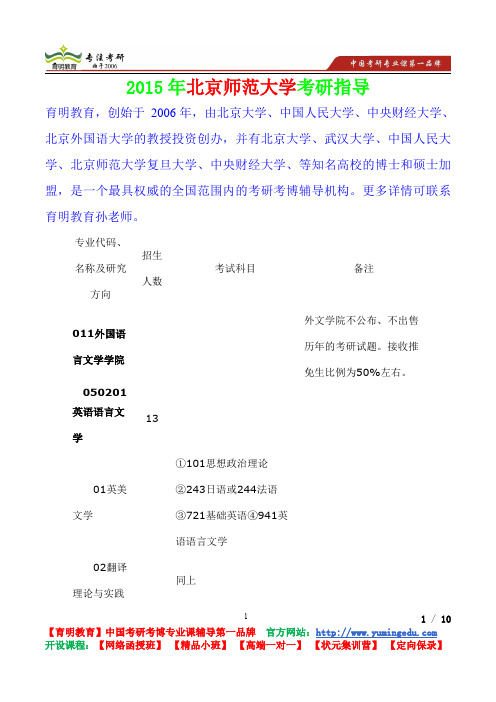
1/10【育明教育】中国考研考博专业课辅导第一品牌官方网站: 12015年北京师范大学考研指导育明教育,创始于2006年,由北京大学、中国人民大学、中央财经大学、北京外国语大学的教授投资创办,并有北京大学、武汉大学、中国人民大学、北京师范大学复旦大学、中央财经大学、等知名高校的博士和硕士加盟,是一个最具权威的全国范围内的考研考博辅导机构。
更多详情可联系育明教育孙老师。
专业代码、名称及研究方向招生人数考试科目备注011外国语言文学学院外文学院不公布、不出售历年的考研试题。
接收推免生比例为50%左右。
050201英语语言文学1301英美文学①101思想政治理论②243日语或244法语③721基础英语④941英语语言文学02翻译理论与实践同上2/10【育明教育】中国考研考博专业课辅导第一品牌官方网站: 2050202俄语语言文学901俄苏文学①101思想政治理论②241英语或243日语或244法语③761基础俄语④944俄语语言文学02俄语教学同上050205日语语言文学901日本文化①101思想政治理论②241英语或244法语③741基础日语④943日语语言文学02日本文学同上03日语语言与教学同上050211外国语言学243/10【育明教育】中国考研考博专业课辅导第一品牌官方网站: 3及应用语言学01语言学①101思想政治理论②243日语或244法语③721基础英语④942英语语言学及应用语言学02英语教学理论与实践同上这里所指的捷径并不是“速成班”、“点金法”,而是合理步骤,让你能够达到“事半功倍”。
相信现在还有很多同学仍然没有确定自己的目标专业院校,一直抱着等等看或者船到桥头自然直的态度,就这么在摸索中复习着。
虽然,我们也是在学习,在进步,但是这种指向性不明确针对性不准确的复习,肯定会消耗掉我们的一些精力和时间。
只有目标明确,才能有的放矢,事半功倍。
4/10【育明教育】中国考研考博专业课辅导第一品牌官方网站: 4尽早确定目标专业院校有很多同学认识不到目标对于行为指导的意义,以及对成功的重大影响力,也有同学自认为确定了目标,具体问了才知道原来所谓的目标就是考研,这个目标太宽泛了,指导不了我们的行为,起码不能很好的指导我们。
2017年2015年北京师范大学文学理论考研真题,考研笔记

坚持原因: 这是一个考验毅力的阶段,无数前人的血泪经验告诉我们,谁坚持到 了最后,谁就能够成功。经过长达三个月的紧张准备,精力和体力都 耗费很大,但是“革命尚未成功,同志仍需努力”。加上周围的同学 开始找工作,很多的机会都可能分散考研的经历和时间。这个时候要 耐得住寂寞,坐得住冷板凳。毅力不坚定,三心二意,是考研的大忌。 很多人没有成功,就是因为机会和诱惑太多了。
三、 论述
试通过对某一文学典型的分析,说明文学典型的美学特征。
2001 年
一、名词解释
1、艺术发现
2、期待视野
3、《机械复制时代的艺术作品》
4、神话原型批评
二 、简答
1、中国“观物取象”说与古希腊“模仿说”的异同。
2、 艺术构思过程中意识与无意识的关系。
3、 象征型文学的特征。 4、风格与话语情境的关系。 5、文学消费的二重性。
2015 年 11 月
电影、新闻、法学、计算机、自动化等,学校可以差一点。这样的好 处是,以后方便就业,具体的原因分析请关注之后的相关文章。 3.购买参考书,慢慢熟悉所考专业。这个时候学校课程还比较多,且 处于学期末,考试又比较多,学校事情繁杂, 无法全身心的投入, 所以以“预热”为主。不易过快进入紧张的复习状态。 4.掌握学习的方法、了解复习的重点,为下一步全面展开复习,奠定 坚实的基础。这一点至关重要,很多考研学生最后没有考出理想的成 绩,不是因为没有努力,更不是付出不够,而是方法不得当,重点没 把握好。这一任务的实现,一般需要有考研经验的师兄师姐的帮助。 这一点也是育明教育专业课授课的重点之一。 5.制定复习计划。一个完备的复习计划是考研成功的“寻宝图”。没 有好的复习计划,只能每天手忙脚乱的复习,昏昏然,却没有丝毫进 步的感觉。 6.在整个过程中,数学和英语都要一步步的安排复习。数学以知识点 的掌握为主,通过做题积累知识点。英语,主要以单词和真题为主, 真题要每做一套就分析透彻。专业课的复习,主要以掌握参考书的目 录和框架为主,不需要去费力的记忆。
北京师范大学文学院儿童文学专业考博真题-参考书-分数线-复习资料-育明考博

(1)外语专业本科(含)以上毕业。
(2) 近五年内曾在同一语种国家留学一学年(8—12个月)(需提供进 修或经中国留学服务中心认证提供学历证明)。
(3)参加雅思(学术类)、托福、德、法、意、西、日、韩语水平考试, 成绩达到以下标准:雅思(学术类)6.5分(3年内有效),托福90分(3年内有 效),德、法、意、西语达到欧洲统一语言参考框架(CECRL)的 B2级,日 语达到二级(N2),韩语达到 TOPIK4级。
(4) GRE 成绩1200分以上(总分为1600)或 GRE 成绩308分以上(总分 为340)(3年内有效)。
(5)GMAT 成绩650分以上(3年内有效)。
(6)WSK(PETS 5)考试合格(3年内有效)。
中国考博辅导首选学校
(7)国家英语六级考试在500分以上(3年内有效)。
复试满分值为 200 分,每小组满分各为 100 分。每小组及格分为 60 分,
一组或两组成绩不及格者不予录取。
每小组由 5 位复试教师组成。考生在每个小组的复试成绩,为该组考官
所给的 5 个成绩按照“去掉一个最高分、去掉一个最低分、其余分数加总再
除以 3”的方法得出。考生两个小组复试成绩相加得出其复试总成绩。
中国考博辅导首选学校
四、报考条件及注意事项
1.拥护中国共产党的领导,愿意为社会主义现代化建设服务,品德良好, 遵纪守法。
2.已获硕士学位人员,或应届硕士毕业生,或符合条件的同等学力人 员(见学校的招生简章),或已获博士学位人员。
3.身体健康状况符合规定的体检标准。
4.年龄一般不超过45周岁(即1969年9月1日以后出生)。
专业代码及名称 外 国 语 业务课一 业务课二 总 分
- 1、下载文档前请自行甄别文档内容的完整性,平台不提供额外的编辑、内容补充、找答案等附加服务。
- 2、"仅部分预览"的文档,不可在线预览部分如存在完整性等问题,可反馈申请退款(可完整预览的文档不适用该条件!)。
- 3、如文档侵犯您的权益,请联系客服反馈,我们会尽快为您处理(人工客服工作时间:9:00-18:30)。
2015北京师范大学文学院考博真题讲义选编
各位考研的同学们,大家好!我是才思的一名学员,现在已经顺利的考上北京师范大学的博士,今天和大家分享一下这个专业的真题笔记方便大家准备考博,希望给大家一定的帮助。
真题集
Part Translation and Writing
Part A Translation
Translate the following into Chinese:
这是谷歌翻译的:可以大概做个参考的。
黑人历来受过良好的教育-看看在城市公立学校的危机-被剥夺了各种机会,创造必要的技术野心
的视力。
黑色的风俗习惯,在美国,那些潜,很大程度上是无意识的,什么是可能的指南的愿望和
行为,因此不包括物理和微积分的思想和信念的模式。
成为一名工程师-不像成为医生或律师或保险
推销员-并没有被看作是一种独立的黑人社区中。
这些风俗习惯非常真实的历史条件下,发展有限,
最好在这个国家的黑人和技术之间的矛盾相互作用。
民俗,“种族意识”,在较慢的速度比社会条件
的变化-这样一个工作的策略可以变成一个沉重的盲目性和自我限制。
Translate the following into English:
Machu Picchu, a lost city located in Peru's tropical mountain forests, wasn't discovered by
American explorer Hiram Bingham until 1911. It stands 2,430m above sea-level, in the middle of
tropical forests. It was probably the most amazing urban creation of the Inca Empire at its height; its
giant walls and terraces seem as if they have been cut naturally in the continuous rock cliffs. The
ancient city, on the eastern slopes of the Andes, surrounds the upper Amazon Basin. The ruins of Machu Picchu are one of the most beautiful and mysterious ancient sites in the
world. While the Inca people erected hundreds of stone structures there from the early 1400’s,
legends and myths indicate that Machu Picchu was a sacred place.The ruins have palaces, baths,
temples, storage rooms and some 150 houses, all in a remarkable state of preservation. These
structures, carved from the gray granite of the mountain top, are wonders of both architectural and
27. The result of the search for an easily digestible fat turned out to be _________________ .
A. commercially useless
B. just as anticipated
C. somewhat controversial
D. quite unexpected
28. Olestra is different from ordinary fats in that ________________ ?
A. it passes through the intestines without being absorbed
B. it facilitates the absorption of vitamins by the body
C. it helps reduce the incidence of heart disease
D. it prevents excessive intake of vitamins
29. What is a possible effect of olestra according to some critics?
A. It may impair the digestive system.
B. It may affect the overall fat intake.
C. It may increase the risk of cancer.
D. It may spoil the consumers’appetite.
30. Why are nutritionists concerned about adding vitamins to olestra?
A. It may lead to the over-consumption of vitamins.
B. People may be induced to eat more than is necessary.
C. The function of the intestines may be weakened.
D. It may trigger a new wave of fake food production.
才思教育自1995年开始开设北京地区高校考研辅导班,其中近90%考上北京知名高校攻读硕士研究生。
2015年,才思教育将继续在“全心全意、因才思教”
的办学宗旨下,踏踏实实地为考研学子指引方向,接受各届同仁的监督。
现2016年中央美术学院考研辅导课程正在火热报名中!
/s/blog_14dbe04f50102vxvt.html
/s/blog_14dbe04f50102vxa7.html
/note/511866664/
/group/topic/78262127/
考研咨询qq:1398338755。
